|
|
|
|
|
GeNPUD v. House of
Justice |
|
Drug Policy
Georgia |
|
March 26, 2018 |
|
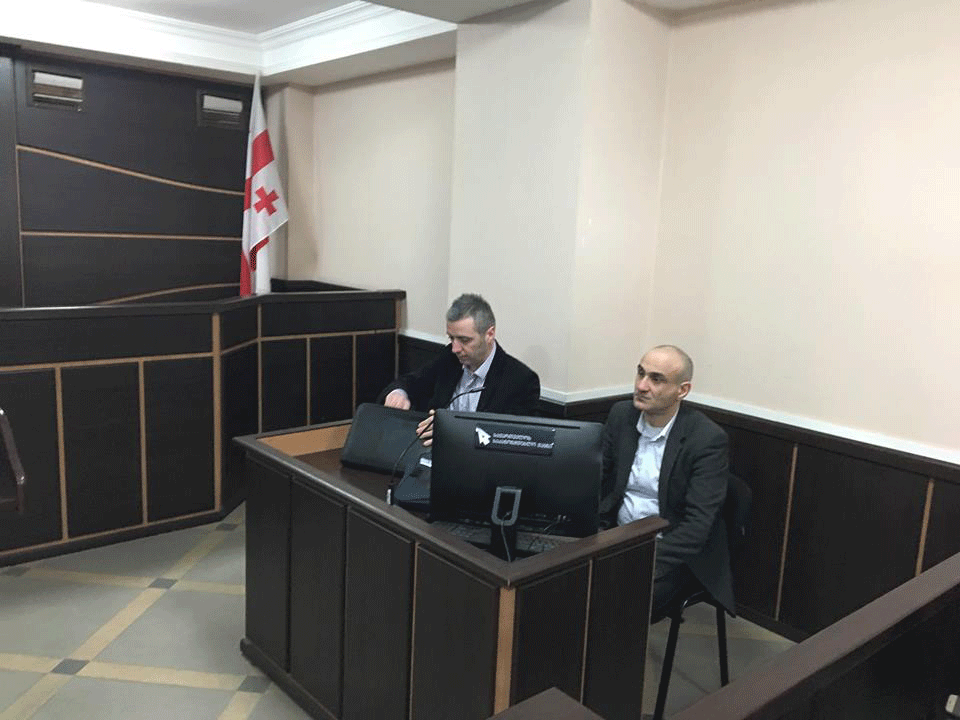 |
On March 26, 2018,
Tbilisi City Court
Judge Tamar
Chuniashvili
delivered a landmark
judgment on allowing
an official
registration of
Georgian Network of
People Who Use Drugs
for Human Drug
Policy (GeNPUD).
The lawsuit was
prepared on behalf
of GeNPUD with the
legal support
provided by lawyer
Levan Jorbenadze,
after the LEPL
National Agency of
Public Registry's
decision GeNPUD was
rejected for
official state
registration. The
registration
rejection was based
only on the name
"problem" because in
the opinion of
public registry the
name of GeNPUD
seemed to be an
attempt “to put the
illegal activities
in legal framework",
which was unfounded
and violated our
community’s
fundamental rights
guaranteed by the
Constitution and the
European Convention.
In the lawsuit and
during the trial
among legal
arguments versus the
Public Registry was
used the Strasbourg
Court’s judgments.
GeNPUD Executive
Director Konstantin
Labartkava’s, as
well as the
|
|
|
representatives’ of ruling
bodies of the organization
and the members make
statement that the Court's
26 March 2018 judgment is an
important means for the
protection of our rights and
interests and the new
opportunities to fight for
our health and the rights
and to further strengthen
the democratic values in our
country. The Judgment is one
of the most important cases
in the path of democratic
development of our country,
freedom of expression
and the establishment of
effective drug policy. |
|
|
|
Executive Director of
GeNPUD at the UN Session on
World Drugs Problem
Document |
|
Drug Policy
Georgia |
|
October 21, 2017 |
|
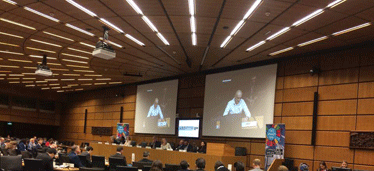 |
On September 26-28, 2017 in Vienna, at
the headquarter of
United Nations
Office on Drugs and
Crime
(UNODC)
the UN
Drug Commission
(Commission on
Narcotic Drugs) post
discussion session
about the UNGASS
adopted
World Drugs Problem
document was
held. The session
was attended along
with the official
representatives of
the United Nations
member states, by
Vienna NGO Committee
on Drugs organized
and invited
representatives of
civil society and
community
organizations from
different countries,
where the interest
groups and drug
users’ community
presented their own
experience.
The UN's official sessions for CSOs
were an effective
opportunity to
reach |
|
|
out to the world leaders in the field of
drug policy and to focus on
the issues that are
important in the countries’
ineffective drug policy
change.
From Georgia as a representative from
civic and community
organizations was invited
Constantine Labartkava –
Executive Director of
Georgian Network of People
Who Use Drugs (GeNPUD), who
on September 28 session
focused the attention of
member states and attendees
on repressive drug policy in
Georgia which on a daily
basis with cruel and violent
actions violates the human
rights, dignity and
diminishes the future (see
summary of the text link on
the
CND blog) of people,
because Georgia remains in
the region the only country
where for personal
consumption drug-related
actions people are
mercilessly persecuted as
criminal offenders. Also, at
the sessions has been
pronounced that the
punishment for drug offenses
in Georgia is
disproportionate, equal to
and exceeds the category of
serious crimes such as:
trafficking, rape, murder
and torture.
Konstantin Labartkava has finished his
word with the main message
that not only drug policy,
but the starting point for
all policies and the target
should be human, freedom and
life.
The session lasted intensively for 3
days, with official speeches
as representatives of member
states and civil society
representatives, including
the United States, Great
Britain, Russia, Estonia,
China, Turkey and others.
The official representative
of Estonia emphasized
the fact that the global
problem of drugs cannot be
resolved with criminal
prosecution. States may
address such measures as
treatment, prevention, and
educational issues. EU
member states address one of
those measures as an
alternate to punishment,
while the most recent drug
policy in the EU also
prefers to use alternatives
instead to punishing, in
this regard the gender issue
should be addressed as well.
Therefore we call on other
member states to apply the
same and use education,
prevention, social
rehabilitation; Great
Britain - should make
sure that treatment and
services are available
without discrimination;
Turkey - draws attention
that the prevention starts
from family; China
believes that the punishment
is the discretion of the
member States, but there
should be focus on
proportionality and from
drug policy point on human
rights; The NGO Help Not
Handcuffs did focus on the
growing problem in the
United States such as heroin
overdoses. The
representative who used
drugs in the past noted that
human rights are violated
mainly by law enforcement
agencies. Death cases also
happen when users are forced
to enroll into certain
programs; On September 27
the thematic sessions also
focused on such important
issues as access to opioids,
the Vienna NGO Committee on
Drugs on (VNGOC)
representative Prof. Oliver
said the repressive drug
policies can hinder the
treatment and the pain
management with problems
such as opioid availability
and with such important
purposes; During the
session, the representatives
of the official member
states and as well as the
civil society organizations
focused their speeches on
the issues such as gender
and special measures for
women convicts in
penitentiary institutions;
Women who use drugs are most
likely to be victims of rape
and other forms of violence
because of existing
stereotypes; Investment in
prevention and education;
Human rights should be a
priority for each drug
policy document – all had
been the issues of the
speeches.
The session was not attended by any of
the government
representatives from
Georgia, which still more
than obviously sustains the
opinion and mirroring all
the sad reality happening in
this country that the
Georgian government will
continue inhuman /
repressive punishment and
even won’t try to get listen
to the civil society or
adopt the draft law from
people which has been
initiated from the Nation
Drug Policy Platform which
if adopted in fact can
dramatically change the
situation for the benefit of
society. |
|
|
|
Constitutional Court's
Judgment on Sowing, Growing
and Cultivation of Weed |
|
Drug Policy
Georgia |
|
July 19, 2017 |
|
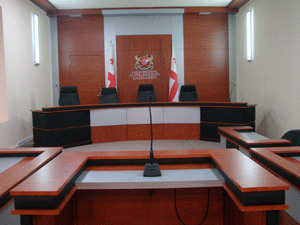 |
Constitutional Court of Georgia
declared
unconstitutional the
imprisonment for
illegal sowing,
growing and
cultivation of weed
up to 266 gr. The
judgment
(#№1/9/701,722,725)
has been delivered
on July 14, 2017 in
Batumi, Georgia.
The case has been lodged to the
Constitutional Court
in December 2015 and
February 2016 by
citizens of Georgia
Jambul Gvianidze,
Davit Khomeriki and
Lasha Gagishvili v.
Parliament of
Georgia. The
applicants had been
incriminated for
different amounts of
weed, up to 266 gr.
The weed in the
amount of 266 gr is
the largest one and
for the largest
amount of narcotics
plants’ (among them
weed) sowing,
growing or
cultivation, Article
265 of the Criminal
Code of Georgia
provided
imprisonment for a
term of six to
twelve years.
Yet one more judgment about Marijuana
but now for sowing,
growing or
cultivation is still
based on and is a
violation of Article
17, section 2 of the
Constitution, which
provides: No one
shall be subjected
to torture,
cruel, inhuman, or
degrading treatment
or punishment. |
|
|
Constitutional Court's judgments in
shaping drug policy of
Georgia is significant at a
time when parliament in this
fall also considering the
reviewing of the draft
package in changing the law
for decriminalization of all
drugs, which has been
submitted to parliament by
National Drug Policy
Platform. Many different
cases still are pending in
the Constitutional Court for
decriminalization of all
drugs and the hope for
changing the cruel policies
in a litigation way, which
can be one of the most
sustainable changes than the
political will or promises
of any of the political
parties. |
|
|
|
Constitutional Court Says no
to Imprisonment for Raw
Marihuana |
|
Drug Policy
Georgia |
|
Levan
Jorbenadze |
|
Legal
Advisor/Attorney |
|
February 19, 2017 |
|
 |
On 15 February, 2017 the
Constitutional Court of
Georgia delivered judgment
#3/1/855 on the basis of the
reference submitted from
Bolnisi Regional Court judge
Tea Leonidze. The judge
making the reference asked
the Court the
constitutionality of
imprisonment for
purchase/possession up to
100 gm raw marihuana under
the Criminal Code of Georgia
Article 260, section 1.
Under the Article 260,
section 1 imprisonment can
be imposed up to 6 years.
On October 28, 2016 the judge stopped
the hearing until
the Constitutional
Court would deliver
the judgment in the
case where person
was charged for
purchase/possession
of up to 100 gm raw
marihuana. The judge
noted that the law
related to 100 gm
raw marihuana is
harsher comparing up
to
70 gm dried one where the
Constitutional Court
already declared the
unconstitutionality
of imprisonment in
the case of Beka
Tsikarishvili v.
Parliament
(application 592,
judgment of
October 24, 2015).
The Constitutional Court in Bolnisi
Regional Court’s
reference case took
the fact into
account that there
are no different
characteristics and
safety |
|
|
issues between the raw and
dried one and declared the
imprisonment
unconstitutional for
purchase and possession of
up to 100 gm raw marihuana. |
|
|
|
Decriminalization/Legalization
and the Constitutional Court
|
|
Drug Policy
Georgia |
|
Levan
Jorbenadze |
|
Legal
Advisor/ |
|
December 31, 2016 |
|
 |
On December 22, 2016
the Constitutional
Court of Georgia
regarding dried
marijuana declares
unconstitutional the
imprisonment under
the both:
administrative and
criminal
responsibility.
Under the
Administrative
Delinquency Code
(Article 45) the use
of imprisonment
declared
unconstitutional for
illegal acquisition
or possession of
small amounts of
drugs without a
purpose of
distribution, and/or
their use without
doctor’s
prescription; And
under the Criminal
Code (Article 273)
the use of
imprisonment for
illegal
manufacturing,
purchase and
storage.
The judgment
technically is a
cause of Ombudsman
of Georgia’s lawsuit
which has been filed
on June 2016, to the
Constitutional
Court, demanding
almost full
decriminalization of
all drugs. However
on December 22, 2016
the Court declared
the case partly
admissible and noted
that the plaintiff
failed to prove why
other punishments
under the Criminal
Code such as the
fine and community
service should not
be imposed. On the
admissibility stage
such declaration
from the Court can
be already regarded
as not a
good sign and
promising one. |
|
|
At least it is already clear
that from this lawsuit there
is no perspective that full
decriminalization of all
drugs will happen.
The judgment of December 22,
2016 is basically a
repercussion of the previous
judgments such as
Tsikarishvili v. Parliament
and the Supreme Court's
references
(#N771,775,776,777,786,787,788),
which already has been found
that under the Article 260
of the Criminal Code a
purchase or possession of
dried marijuana up to 70
grams for personal purposes
had been regarded
disproportional and as
torture, inhuman and
degrading treatment and
punishment, and under
Article 273 of the Criminal
Code imprisonment for
marijuana use was also found
to be unconstitutional. The
Constitutional Court while
delivering the admissibility
judgment of December 22 case
primarily noted that it had
already found a violation of
Article 17 of the
Constitution in the cases of
Tsikarishvili v. Parliament
and the Supreme Court's a
number of references and
this case technically gives
the grounds to declare the
unconstitutionality of the
above mentioned prohibited
activities.
From the recent judgments of
the Constitutional Court,
can be mainly concluded that
currently there is no
responsibility in terms of
jail under either
administrative or criminal
one for purchase or
possession of dried
marijuana up to 70 grams,
use of marijuana or its
manufacturing for personal
purposes. But still: under
administrative code there is
a fine in the amount of 500
GEL, under the Criminal Code
also fine in the amount of
at least 1000 GEL and the
community service for dried
marijuana’s illegal
manufacturing, purchase,
storage or illegal
consumption without medical
prescription of drugs, their
analogues or precursors in
small quantity for personal
consumption.
Recent developments in
Georgia indicates a rather
increasing demands from the
society to the drug policy
liberalization, thus as
towards the
decriminalization of all
drugs and the legalization
of marijuana. In this
conjuncture many cases still
are pending in the
Constitutional Court for
decriminalization and
legalization. Regarding the
legalization the opposition
party New Political Centre -
Girchi leader Zurab
Japaridze sees the
legalization of marijuana as
one of the most effective
tool towards the economic
boost and prosperity of the
country and on 31 December
the eve of the New Year as a
protest against the
government, with more than
500 registered sowers and
thousands of supporters
plans to plant the seed of
marijuana right in the
office of his political
party. The Girchi already
with this actions gained
significant popularity and
attracted thousands of
official supporters via
official facebook page.
|
|
|
|
Law Kills! |
|
|
Drug Policy
Georgia |
|
December 10, 2016 |
 |
For
the
forthcoming
Human
Rights
Day
on
December
7 a
rally
was
held
to
change
the
killer
drug
policy
in
the
country.
The
rally
which
has
been
Initiated
and
organized
by
Georgian
Network
of
People
Who
Use
Drugs
(GeNPUD)
with
the
support
of
Tanadgoma
and
Georgian
Harm
Reduction
Network,
also
been
supported
by
Georgian
National
Drug
Policy
Platform.
Many
hundreds
of
people
gathered
around
the
organizers’
preinstalled
gallows
in
front
of
parliament,
in
Tbilisi,
demanding,
and
once
again
with
concrete
arguments,
cases
and
emotions
shouting
on
the
government
to
keep
the
promises
for
drug
policy
change
they’ve
made
before
the
elections.
The
rally
organizers
demonstrated
a
gallows
as a
symbol
to
reflect
the
reality
of
Georgian
drug
policy,
which
has
already
during
the
several
|
|
|
decades
been a
negatively
distinguished
as inhuman,
uncivilized
and human
killing drug
policy. The
very drug
policy in
this country
which causes
poverty,
breaches the
fundamental
rights,
among them
right to
life and
right to be
protected
from
torture,
inhuman and
degrading
treatment.
It is absolutely staggering that in
this
country,
because of
the
totalitarian
persecution
based system
remains, it
has already
made many
young people
to commit
suicide. In
addition in
spite of the
promises,
the current
elect
government
seems not
willing to
change the
zero
tolerance
policy and
still
continues
the massive
incarcerations,
persecution
of our
families,
raising the
rate of
crime, and
fighting
against the
progress and
community
interests.
The rally has been one of the
important
spotlights
on December
7 in all
kinds of
media
coverage,
attracting
the majority
political
and main
opposition
leaders for
comments. On
December 10
still one
more rally
has been
organized by
Georgian
National
Drug Policy
Platform
member the
White Noise
Movement
with the
main goal to
change the
drug policy
and calling
the
government
for full
decriminalization
of all drugs
and once
again
demonstrating
to the
government
that the
community
will unite
and stand
for the
fundamental
rights
protection.
|
|
|
|
Imprisonment
for Use of
Marijuana is
Unconstitutional
|
|
Drug Policy
Change Via
Litigation
|
|
Drug Policy
Georgia |
|
Levan
Jorbenadze |
|
Legal
Advisor/Attorney |
|
September 30, 2016 |
|
 |
Now
on
September
29,
2016
the
Constitutional
Court
of
Georgia
declares
unconstitutional
the
imprisonment
for
use
of
marijuana.
The
Court
passed
judgment
after
the
Supreme
Court's
a
number
of
references
(#N771,775,776,777,786,787,788)
to
the
Constitutional
Court.
Accordingly
what
is
very
important,
it
is
now
the
Supreme
Court’s
contribution
in
the
decriminalization
of
the
use
of
marijuana.
The
Constitutional
Court
in
this
case
primarily
noted
that
as
it
had
already
found
a
violation
of
Article
17
of
the
Constitution
in
the
case
of
Tsikarishvili
v.
Parliament
and
the
punishment
for
purchase
or
possession
of
marijuana
up
to
70
grams
had
been
regarded
disproportional
and
as
torture,
inhuman
and
degrading
treatment
and
punishment,
than
now
Article
273
of
the
Criminal
Code
should
be
also
declared
unconstitutional
in
regards
to
marijuana
use,
which
is
not
more
dangerous
than
that
of
possessing
it.
The
Current
Article
273
of
the
criminal
code
of
Georgia
envisions
|
|
|
responsibility
up to one
year
imprisonment
for any drug
use and
provides:
“Illegal
manufacturing,
purchase,
storage or
illegal
consumption
without
medical
prescription
of drugs,
their
analogues or
precursors
in small
quantity for
personal
consumption,
by a person
who has been
subjected to
an
administrative
penalty for
the
commission
of such an
act, or who
has been
convicted of
this crime,
- shall be
punished by
a fine or
community
service
from120 to
180 hours or
by
imprisonment
for up to a
year. Note:
The fine
defined in
this article
shall not be
less than
double the
amount of
the fine
determined
by the
relevant
article of
the
Administrative
Offences
Code of
Georgia”.
Administrative
Offences
Code of
Georgia -
Article 45:
Illegal
acquisition
or
possession
small
amounts of
drugs
without a
purpose of
distribution,
and/or their
use without
doctor’s
prescription,
- will lead
to a fine of
500GL or, in
exclusive
cases,
according
the
circumstances
of a case
and personal
characteristics
of an
offender
when this
measure is
considered
insufficient,
- with
administrative
imprisonment
up 15 days.
Georgian
Constitutional
Court
continues
the liberal moves
towards
decriminalization
of marijuana
and there
are still
very
important
lawsuits
pending at
the Court
such as the
Ombudsman of
Georgia v.
Parliament
(claiming
for full
decriminalization
from
administrative
and criminal
responsibilities
regarding
all drugs); Konstantine
Labartkava
(chairman of
“New
Vector”),
Malkhas
Nozadze and
Irakli
Gigolashvili
v.
Parliament;
in addition
Vasil
Mardaleishvili
submitted
the lawsuit
v.
Parliament.
The
plaintiffs
in this case
alleging
unconstitutionality
of the Law
on Combating
Drug-Related
Crime,
sections 1
and 2 of
Article 3,
for 3-5
years
deprivation
of rights of
users such
as driving
license,
medical
and/or
pharmaceutical
practice and
establish,
manage, or
represent a
pharmacy;
practice
law; job in
pedagogical
and
educational
institutions;
job in
public
bodies - in
treasury
(budgetary)
institutions
of the state
and local
government;
a right to
be elected;
the right to
manufacture,
purchase,
store and
carry
weapons. The
plaintiffs
in addition
alleging
unconstitutionality
of Article
17,
subparagraph
a) of Law on
Public
Service,
which
provides
that a
person shall
not be
recruited
for public
service if:
he/she has
unexpunged
conviction
for
committing a
premeditated
crime.
As it seems
from the
recent
developments
in the drug
policy of
Georgia,
this country
is not far
from full
decriminalization
of marijuana
and all the
other
drugs, which
finally will
end the many
decades of
the zero
tolerance/harshest
drug policy
in this
country, but
what is the
most
important
Georgia
already
moves
towards the
decriminalization
not by
political
way of
changing the
drug policy
but in a
litigation
way. Thus in
this
juncture
there is the
strongest
and stable
legal
background
not to ever
go back what
it was like,
the very
background
which has
been created
by
Constitutional
Court and
then through
references
of the
Supreme
Court of
Georgia. The
Constitutional
Court
judgments
are final
and not
subject to
appeal. |
|
|
|
Drug Policy
National
Platform
Statement on
the death of
Demur Sturua |
|
August 20, 2016 |
|
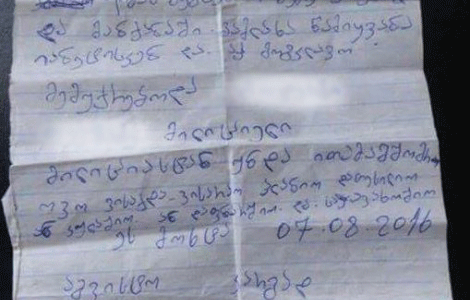 |
Drug Policy Georgia joins the below
mentioned
statement
on
the
death
of
Demur
Sturua,
who
committed
suicide
on
August
8,
2016
because
of
intimidation
from
a
local
police
officer
in
Samtredia
region.
The
police
officer
intimidated
Demur
Sturua
to
reveal
the
facts
concerning
Marijuana
growing.
He
left
the
written
letter
describing
the
police
officer’s
conduct
against
him.
We are very concerned on the death of
22
year
young
man
–
Demur
Sturua.
We
are
deeply
sad
on
his
death
and
feel
his
family’s
and
friends’
sadness.
We
demand
prompt
and
fair
investigation
of
such
a
horrible
fact
and
punishment
of
those
who
are
responsible.
We are shocked about the fact that a
young
person
might
commit
suicide
on
the
basis
of
the
intense
influence,
threat
and
violence
from
a
police
officer.
The
written
letter
left
by
him
is a
thorough
reflection
of
repressive
|
|
|
|
|
system and a
widespread
practice
which has
been formed
by current
drug policy.
The current drug policy is soviet
style
remains
directed
only against
persecution
of people
and unfair
punishment,
and
exclusively
serves law
enforcement’s
private
institutional
needs –
having a
tool of
intimidation
and fear to
make
forcible
cooperation
and
information
delivery.
The drug
policy of
Georgia is
irrational
and inhuman,
violates
human rights
and dignity.
Georgian
“killer”
drug policy
has no
analogy in a
civilized
world. There
is no
evidence
having
positive
results from
such policy,
on the
contrary
experience
and facts
that make
young people
criminals,
torture,
death and
forms unfair
and
degrading
public
policy.
If the facts described in Demur’s
letter
confirmed,
the
responsible
should be
not only the
very police
officer but
entirely the
Ministry of
Internal
Affairs,
Government
of Georgia
and those
decision
makers who
by act or
inactivity,
helps the
current
reckless and
inhuman drug
policy in
Georgia and
who
contradicts
any
progressive
amendments
within this
directions.
We demand the Georgian Government for
immediate
drug policy
reform,
which at
least
includes the
change of
drug policy
and increase
of care and
help
programs.
Georgian
National
Drug Policy
Platform is
ready to
introduce
the package
of the
legislative
amendments
and a
detailed
plan and
contribute
to drug
policy
reform
process.
Georgian National Drug Policy Platform
Georgian Network of People Who Use
Drugs (GeNPUD),
White Noise
Movement,
June 2
Movement,
Addiction
Research
Centre –
Alternative
Georgia,
Georgian
Harm
Reduction
Network,
Anti-Violence
Network of
Georgia,
Georgian
National
Association
of Mental
Health,
Georgian
Young
Lawyer’s
Association,
Association
of Georgian
Addictologists,
Georgian
Mental
Health
Coalition,
Georgian
Community
Advisory
Board (Ge-CAB),
Georgian
Institute of
Public
Affairs,
Center for
Training and
Consultancy
(CTC),
Medical
Centre “Uranti”,
Clinic “Neogen”,
New Vector,
Article 42
of the
Constitution,
Tanadgoma,
Hepa Plus,
Rubikoni,
Step to the
Future,
Akeso,
Ksenoni, The
Centre for
the
Protection
of
Constitutional
Rights, Real
People Real
Vision,
Positive
Choice,
Imedi,
Pheniksi
2009, Hera
XXI, New
Way, Global
Initiative
in
Psychiatry –
Tbilisi,
European
Students for
Liberty, The
Initiative
for
Vulnerable
Groups
Rehabilitation,
Public Unity
“Bemoni”,
Disease
Prevention,
Control and
Nonproliferation
Centre,
Human Rights
Education
and
Monitoring
Centre,
Georgian Red
Cross
Society. |
|
|
|
New era of
drug policy
change
lawsuits in
the
Constitutional
Court |
|
Drug Policy
Georgia |
|
Levan
Jorbenadze |
|
Legal
Advisor/Attorney |
|
June 18, 2016 |
 |
The
Public
Defender
declared
that
imprisonment
of
drug
users
should
be
unconstitutional
and
on
June
15,
2016
filed
a
lawsuit
to
the
Constitutional
Court,
in
which
he
disputes
the
constitutionality
of
article
45
of
the
Code
of
Administrative
Offences
and
article
273
of
the
Criminal
Code
of
Georgia.
According
to
the
Public
Defender,
the
use
of
drugs
without
doctor's
prescription
is
punished
by a
15-day
administrative
detention,
while
in
the
repeated
case
drug
users
are
punished
by a
fine
of
up
to
1000
GEL
and
a
1-year
jail,
which
is
not
in
line
with
the
public
threat
and
interest
that
may
be
caused
by
the
actions
envisaged
by
the
mentioned
articles,
and
therefore,
is
in
breach
to
paragraphs
1
and
2 of
article
17
of
the
Constitution
of
Georgia,
pertaining
to
protection
of a
person
from
degrading
and
inhuman
punishment.
In
addition
the
Public
defender’s
statement
notes
that
a
necessary
element
of a
crime
envisaged
by
article
273
of
the
Criminal
Code
of
Georgia
is
an
action,
for
which
a
person
had
already
been
held
responsible;
this
is
contrary
to
the
principle
of
prohibition
of
repeated
punishment
of a
person
for
one
and
the
same
crime,
enshrined
in
article
42of
the
Constitution
of
|
|
|
Georgia - "No one shall be
convicted twice for the same
offense."
On the basis
of some high
ranking
disputed
political
cases there
has been
already for
years so
called
strained
relations
between the
Constitutional
Court and
other
government
branches
particular
the Ministry
of Justice
and
Parliament.
However it
might be
said that
this
situation
gave some
advantages
to the
plaintiffs.
In the drug
policy field
the
Constitutional
Court had
already
delivered
the judgment
in favor of
the
plaintiff.
For example
On October
24, 2015 in
the case of
Beka
Tsikarishvili
v.
Parliament
(application
592) the
Constitutional
Court of
Georgia
declared
unconstitutional
the
imprisonment
for purchase
and keeping
of marijuana
for personal
use. The
court ruled
that
imposing
such
punishment
is mainly a
torture,
cruel,
inhuman, or
degrading
treatment.
In December
2015 the new
case
Konstantine
Labartkava
(chairman of
“New
Vector”),
Malkhas
Nozadze and
Irakli
Gigolashvili
v.
Parliament,
followed. In
addition an
independent
plaintiff
Vasil
Mardaleishvili
submitted
the lawsuit
v.
Parliament.
The
plaintiffs
in this case
alleging
unconstitutionality
of the Law
on Combating
Drug-Related
Crime,
sections 1
and 2 of
Article 3,
for 3-5
years
deprivation
of rights of
users such
as driving
license,
medical
and/or
pharmaceutical
practice and
establish,
manage, or
represent a
pharmacy;
practice
law; job in
pedagogical
and
educational
institutions;
job in
public
bodies - in
treasury
(budgetary)
institutions
of the state
and local
government;
a right to
be elected;
the right to
manufacture,
purchase,
store and
carry
weapons. The
plaintiffs
in addition
alleging
unconstitutionality
of Article
17,
subparagraph
a) of Law on
Public
Service,
which
provides
that a
person shall
not be
recruited
for public
service if:
he/she has
unexpunged
conviction
for
committing a
premeditated
crime.
Public
Defender
declaring
that country
needs human
rights based
drug policy,
as mentioned
filed a new
lawsuit to
the Court
seeking for
complete
depenalization
and
decriminalization
of drug use.
But this
later case
is very
controversial
one and can
bring either
positive or
negative
consequences.
If the case
is won and
the Court
declares
that
administrative
and criminal
punishment
for drug use
is
unconstitutional
then
Parliament
should adopt
the new law,
but if the
case is lost
then it
gives very
strong
argument and
evidence for
pro
punishment
supporters
and
government
against drug
policy
change
advocates.
|
|
|
|
Imprisonment
for Purchase
and Keeping
of Marijuana
is
Unconstitutional
|
|
Drug Policy
Georgia |
|
Levan
Jorbenadze |
|
Legal
Advisor/Attorney |
|
October 25,
2015 |
|
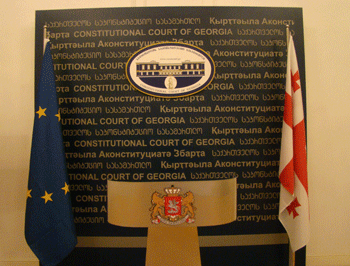 |
On October 24, 2015 in the case of
Beka
Tsikarishvili
v.
Parliament
(application
592)
the
Constitutional
Court
of
Georgia
declared
unconstitutional
the
imprisonment
for
purchase
and
keeping
of
marijuana
for
personal
use.
The
court
ruled
that
imposing
such
punishment
is
mainly
a
torture,
cruel,
inhuman,
or
degrading
treatment.
On October 24 the Constitutional Court
made
a
big
and
progressive
step
for
changing
the
repressive
drug
policy
of
Georgia
and
took
a
heavy
burden
out
of
the
society,
which
in
general
one
more
time
highlighted
Georgia’s
rank
in
democratic
index
in
the
region
and
at
an
international
level.
According to the official website of
the
Constitutional
Court
where
the
information
published
on
24
October
2015
the
court
notes
that
purchase
and
keeping
of
70
grams
of
marijuana
for
which
the
applicant
is
charged
cannot
be
indicative
towards
the
purposes
of
sale
or
its
real
intent,
and
imposing
the
imprisonment
amounts
to
torture,
cruel,
inhuman,
or
degrading
treatment
confronting
the
Article
17
of
the
Constitution.
|
|
|
Article
17 § 2 of
Georgian
Constitution
provide: “No
one shall be
subjected to
torture,
cruel,
inhuman, or
degrading
treatment or
punishment”.
The Court further notes that current
legislation
considers
50-500 grams
of marijuana
as a large
amount. The
Court
considers
that keeping
70 grams of
dry
marijuana do
not
represent
such an
amount which
might
indicate to
the
intention of
sale of
drug. The
court noted
that
legislature
have an
obligation
to form such
provisions
which will
enable a
judge to
find the
fact if
there is an
intention of
sale during
purchase or
keeping of
marijuana or
probability
of such an
intention
and finally
impose the
imprisonment
only in the
case of
established
intention of
sale.
It is worth mention that this
marijuana
judgment
coincided to
a period
when the
Constitutional
Court
perceived in
society as
an angry one
and
confronting
with
parliament
which is the
result of
the Court’s
previous 16
September
2015
judgment in
the case the
former
Tbilisi
mayor George
Ugulava v.
Parliament.
This
judgment
enabled one
day freedom
to George
Ugulava, who
has
corruption
charges and
is
imprisoned.
After that
judgment of
the
Constitutional
Court, on
the one hand
the majority
MPs from the
ruling
party, among
them the
chairman of
parliament
and on the
other the
chairman of
the
Constitutional
Court made
confronting
statements
against one
another.
The Constitutional Court has not
released an
official
judgment
yet, which
abolishes
the use of
imprisonment
for purchase
and keeping
of marijuana
without the
intention of
sale, which
will enable
public more
important
and positive
details to
know, but it
should be
also
mentioned
that the
Court did
not rule on
the
decriminalization
of marijuana
because it
was not a
subject of
the dispute
and a claim in
this case. |
|
|
|
Intention to mitigate
the massive drug tests |
|
Drug Policy
Georgia |
|
Levan
Jorbenadze |
|
Legal
Advisor/Attorney |
|
October 18, 2015 |
|
 |
Ministry of Internal Affairs of
Georgia issued
a new specific instruction –
ordinance #725 with the
intention to instruct police
officers in the
administration of drug
tests. Administrative
Offences Code of Georgia
punishes first time
offenders with fine 500 GEL
and administrative detention
up to 15 days for purchase
or storage of a small
quantity of drugs without
the intent to sell and/or
use of drugs without a
doctor’s prescription. If it
reoffended then criminal
prosecution started and
punished with higher fines
and up to 1 year in jail or
up to the circumstances of
the case even
without administrative
offences it might be up to
14 years or life
imprisonment.
Every
single person can be subject
to drug urine testing if
reasonably suspected. The
very first drug positive
test is very important as it
puts the drug user in the
special list maintained by
police, which is one of the
unamended
and
complicated
list.
The
system
of
the list
allows
the
law
|
|
|
enforcement
to determine
the further
arbitrary
prosecution
activities.
The drug
tests
conducted
under the
conditions
of violation
of the basic
human rights
principles.
In the most
cases drug
tests are
useless and
having
direct
negative
impact on
human
dignity and
life. The
drug tests
are subject
of even of political prosecution using
it as a tool against
political rivals and for
other illegal activities.
Massive drug tests were always subject
to public criticism. With the
intention to put to the end of
this practice the Minister of
Internal Affairs issued new
instruction taking effect on
October 1, 2015, but this new
regulation is under question and
it mostly depends how
effectively it will be
administered in practice. The
ordinance still gives a very
wide margin
of
interpretation
to carry out drug-testing in
cases such as: a) A law
enforcement official witnessed
drug use; b) Official while
according to the law on police
conducting preventive measures
such as - identifying a person,
carrying out frisk and
examination of a person,
carrying out special inspection
and examination, carrying out
special police control, ordering
to leave a place and prohibiting
entrance to a certain territory
and there is enough reason to
suggest a person used drugs; c)
The information obtained from
the criminal intelligence
activities, LEPL
emergency service
112 or the
information from an identified
person.
Even the subparagraph c) The
information obtained from the
criminal intelligence activities
can be subject to manipulation
and speculation, which was the case until 1
October, 2015 and even putting it into
the instruction can make no
difference. In addition the
article 4 paragraph 3 of the
ordinance 725 allows the use of
coercive measures (use of
physical force, special means)
if the person refuses drug-
testing.
The instructions for police officers
were one of the recommendations
from public organizations and
independent activists but how
this new regulation with such
wide interpretations will be put
in practice is still up to the
will of the government and judicial
system. |
|
|
|
The state of
Colorado
success
after
one-year
legalization |
|
Drug Policy
Georgia |
|
Levan
Jorbenadze |
|
Legal
Advisor/Attorney |
|
January 24, 2015 |
|
 |
Tens
of
thousands
of
people
were
not
arrested
for
marijuana
possession,
the
state
has
collected
nearly
$40
million
in
new
tax
revenue,
and
almost
$8
million
has
been
allocated
to
fund
youth
education
and
drug
prevention
efforts.
The
report
of
the
US
based
non-profit
the
Drug
Policy
Alliance
also
gives
us
the
significant
figures
regarding
decrease
in
crime
rates,
a
decrease
in
traffic
fatalities,
an
increase
in
tax
revenue
and
an
increase
in
jobs
and
all
since
January
1st
2014
when
first
retail
marijuana
stores
opened.
Here
are
some
of
the
interesting
highlights
from
the
report:
Decrease
in
Crime
Rates
-
burglaries
in
Denver
decreased
by
9.5%
and
overall
property
crime
decreased
by
8.9%;
Tax
Revenue
-
tax
revenue
from
retail
marijuana
sales
amounted
to
$40.9
million
between
January
2014
and
October
2014,
not
including
revenue
from
medical
marijuana
and
licenses
and
fees.
Colorado
joint
budget
committee
set
aside
$2.5
million
to
increase
the
number
of
health
professionals
in
Colorado
public
schools.
Many
of
the
newly
hired
health
workers,
including
nurses
and
social
workers,
will
focus
on
mental
health
support
and
on
programs
to
educate
students
about drug
use. |
|
|
Decrease in
Traffic
Fatalities
-
challenging
claims that
the
legalization
of marijuana
would lead
to an
increase in
traffic
fatalities,
there
opposite to
show: in the
first 11
months of
2014, the
state had
436 traffic
fatalities,
a 3% drop
from the 449
fatalities
in the first
11 months of
2013.
Youth
Prevention
Efforts
- the state
has
allocated
more than $8
million in
retail
marijuana
tax revenue
for youth
prevention
and
education,
mental
health and
community
based
developmental
programs
(read the
full
report).
For the
first time,
on November
6, 2012, two
American
states
Colorado and
Washington
have
legalized
the
recreational
use and sale
of
marijuana,
followed by
Oregon,
Alaska and
Washington
DC.
Then it took
about a year
to kick the
process of
regulations
and now we
hear the
success
stories not
only from
Colorado.
Still some
other states
are already
willing to
follow weed
legalization.
At the same
2012 the
full
legalization
also took
place in
Uruguay,
bringing its
president
José Mujica
a Nobel
peace prize,
who
talked-about
marijuana
legalization
as a tool
for peace
and
understanding.
On June 2,
2013 the
first
marijuana
rally “2.06”
took place
in Tbilisi
which made
history,
however
country of
Georgia
still makes
no progress
regarding
the change
of cruel and
inhuman drug
policy, but
opposite is
happening: detaining and hunting
on youth and their families,
crime rate rising, fighting
against development and society,
which finally favors the black
market and causes the corruption.
|
|
|
|
No more
punishment
for
overdoses |
|
Drug Policy
Georgia |
|
Levan
Jorbenadze |
|
Legal
Advisor/Attorney |
|
August 14,
2014 |
|
 |
Medical institutions and its doctors
were
obliged
to
report
the
cases
of
drug
overdoses
to
police
and
many
of
them
in
fact
obeyed
5
December
2000,
#239/ნ
order
of
the
Minister
of
Labour,
Health
and
Social
Affairs
of
Georgia.
The
controversial
order
made
reluctant
many
overdose
witnesses
and
victims
for
applying
the
medical
service
providers
because
of
the
fear
of
not
caught
by
police.
As a
result
there
were
many
fatal
cases.
On August 11, 2014 the order was amended
and
is
already
in
force.
Since
11
August
2014
the
medical
service
providers
have
no
obligation
to
report
the
drug
overdose
cases
to
police.
On
August
12
the
amendment
was
widely
circulated
in
the news
media.
As
one
of
the
representative
from
the
Ministry
of
Internal
Affairs
(police)
noted
there
was
an
internal
regulation
of
the
Minister
of
Internal
Affairs
not
to
go
after
the
overdose
cases
–
thus
it
was
a de
facto
during
past
two
years
and
now
it
is a
de
jure
situation.
|
|
|
This new amendment in drug legislation
is a
progressive
change
however
Georgia
still has
one of the
harshest
drug
policies in
the region
and on its
account many
individual
victims and
families.
According to the current legislation
drug use,
keep and
purchase for
the purpose
of personal
use in small
quantities
is still
punishable
either by
fine 500 GEL
or
administrative
imprisonment
up to one
month, while
during a one
year if
busted
second time
a drug user
is subject
to the
criminal
prosecution
with the
highest
fines which
might be
some 5000
GEL and
imprisonment
up to one
year. At the
same time
because of
inhuman and
unclear
practice
most of the
drug users
prosecuted
under
article 260
of criminal
code with up
to 11, 7-14
years or
life
imprisonment
and
deprivation
of
fundamental
civil
rights.
There is no
categorization
of drugs and
any
practical
distinction
between
dealers,
casual
users,
commercial
dealers and
dependent
users. In
addition
there is no
distinction
of soft and
hard drugs
neither in
theory nor
in practice.
The current legislation of Georgia
allows the
de facto
decriminalization
of all types
of drugs but
there is
still no
political
will to
implement
pragmatic
drug policy
and save
human life,
protect
public
health and
interests of
the society. |
|
|
Global
Health and
Human Rights
Database
Officially
Launched
|
|
Drug Policy
Georgia |
|
November 30, 2013 |
|
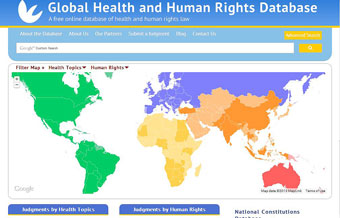 |
The
Global
Health
and
Human
Rights
Database
(www.globalhealthrights.org)
is a
free
online
database
of
judgments
from
around
the
world
relating
to
health
and
human
rights.
This
Database
is a
free
searchable
online
database
for
now
with
the
thousands
of
judgments,
national
constitutions
and
international
instruments
related
to
the
health
and
human
rights.
As
one
of
the
most
fundamental
rights
the
right
to
health
and
other
health-related
rights
have
been
enshrined
in a
number
of
international
treaties,
regional
instruments,
and
national
constitutions
and
laws.
The
rights
to
health
and
in
this
regard
the
states’
obligation
to
provide
not
only
just
access
to
the
right
to
health
but
with
certain
attainable
standards
have
been
the
issue
of
interpretation
and
challenge
for
national
courts
and
international
and
regional
human
rights
bodies
all
around
the
world.
|
|
|
The Database
is the first
attempt to
make health
and human
rights law
from both
common and
civil law
jurisdictions
available
online for
free of
charge, and
features
case law
from around
the world.
The Database
provides
original
translations
of the case
law
previously
unavailable
in English.
According to
the
Global
Network for
Public
Interest Law
an official
public
launch of
the Database
was held on
24 October
2013, at the
headquarters
of the
United
Nations in
New York.
Lawyers
Collective
and the
O’Neill
Institute
for National
and Global
Health Law
at
Georgetown
University
developed
the database
in
collaboration
with a
worldwide
network of
civil
society and
individual
attorney
partners. In
Tbilisi,
Georgia
attorney
partners of
the Lawyers
Collective
were Levan
Jorbenadze,
Drug Policy
Georgia and
Nato Papava.
Lawyers
Collective (www.lawyerscollective.org)
is a New
Delhi,
Mumbai based
leading NGO
in India
focusing on
strategic
litigation
and advocacy
in HIV/AIDS
and women’s
rights.
The creation
of the
Database
made
possible
with the
support of
the
Levi-Strauss
Foundation
and the Ford
Foundation.
The Database
might be
useful for
research and
lawyer
practitioners
and for
scholars or
policy
makers
analyzing
the legal
documents. |
|
|
|
My
Repression,
Your Regress |
|
Drug Policy
Georgia |
|
November 24, 2013 |
|
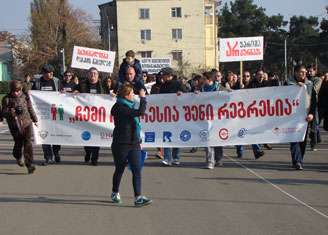 |
“Existing
drug
policy
is
oriented
on
punishment
of
people
who
use
drugs
rather
than
their
support
and
social
reintegration.
This
further
intensifies
the
problem
and
negative
consequences
caused
by
it”
–
this
was
one
of
the
main
reasons
that
“Georgian
Network
of
People
using
Drugs“
on
November
24
2013
organized
a
protest
action
against
“Street
Drug
Testing”.
The
protest
action
with
the
drug
testing
improvisation
as
urinating
into
the
state
budget
was
held
in
front
of
Ministry
of
Internal
Affairs
(police)
building.
This
protest
action
as
an
event
was
also
created
on facebook
by
Giorgi
Gogua:
“Based
on
repressive
drug
legislation,
for
the
past
decades
Ministry
of
Internal
Affairs
(MIA)
have
been
implementing
punitive
approaches
towards
people
who
use
drugs
(PUDs),
which
deteriorated
their
health
conditions,
caused
severe
socio-economic
harms
to
their
families
and
caused
their
isolation,
further
aggravating
overall
situation.
Unfortunately,
|
|
|
despite the
change in
government
MIA still
continues
punishment
of PUDs.
One of the
methods is
so called
“street drug
testing”.
Police take
thousands of
citizens to
specialized
facilities
for drug
testing
leading to
administrative
and penal
sanctions
which is a
heavy burden
for PUDs and
their
families".
|
|
|
|
One more
victim of
Marijuana
criminalization
in Tbilisi |
|
Drug Policy
Georgia |
|
Levan
Jorbenadze |
|
Legal
Advisor/Attorney |
|
July 21, 2013 |
|
 |
A
young,
36
years
old
male
Mamuka
Mikautadze
committed
suicide
after
police
interrogation
on
marijuana
charges.
He
was
arrested
in
Tbilisi
when
his
friend
approached
by
car
to
give
him
some
marijuana
as a
gift.
Both
persons
were
taken
at
the
main
Tbilisi
police
division.
According
to
the
official
testimony
on
July
5
2013
Mamuka
confessed
against
his
friend
who
brought
him
marijuana.
It
was
also
reported
the
he
was
threatened
with
9
years
of
imprisonments.
Right
after
the
interrogation
at
the
next
day
on
July
6 he
was
found
hanging
from
a
rope
in
tree
near
the
Tbilisi
Sea.
“You
will
have
to
live
and
raise
children
alone
because
after
such
a
fact
I
not be
able to
continue
living" –
the words
that he said
to his wife,
which was
|
|
|
reported by
media. In
addition he
said to his
family and
friends that
he was
subject to
inhuman and
degrading
treatment
during the
police
interrogation.
According to
the
alternative
independent
forensic
examination
there were
bruises
found on
Mamuka’s
face, which
once again
confirmed
the version
of some
mistreatment
at the
police main
department.
On July 16,
2013 the
Ministry of
Internal
Affairs
denied any
allegations
and
misconduct
of police
and released
the official
investigation
case files
to the
public.
According to
the national
forensic
conclusion
there were
no sign of a
physical
injury on
the face of
Mamuka
Mikautadze
but injury
to the neck,
which caused
Mikautadze’s
death, were
found on the
body. Thus,
the General
Inspection
at the
Ministry of
Internal
Affairs
concluded
that there
were no
signs of
physical
pressure
against
Mamuka
Mikautadze
from the
criminal
police
officers.
The
investigation
is still
underway.
There are
versions on
the causes
of suicide
whether
police, some
stereotypic
dumb
attitudes in
the
communities,
‘criminal
authorities’
and etc., but
the root of
all these
human
tragedies
are the
senseless
criminalization
of drugs
including
marijuana
and no
pragmatic
approach to
these
issues.
According to
the current
legislation
of Georgia
there are no
distinction
of soft and
hard drugs
neither in
theory nor
it is in
practice.
The drug
charges are
extremely
unreasonable
which up to
life
imprisonment.
The only
distinctions
are in
quantities
of drugs but
not in line
with the
reality.
On June 2,
2013 the
first such
scale
marijuana
rally “2.06”
held in
Tbilisi made
history,
organized
via social
network -
facebook.
The public
demanded
decriminalization
of marijuana
with one of
the points
that in the
21st century
a state
prosecution
of users
unacceptable
for a
civilized
world.
Recently
speaking at
the press
conference
Minister of
Health on
May 10
pointed out
to
distinguishing
marijuana
from other
drugs. He
added the
issue
required a
"well-considered
strategy"
and said the
legalization
of marijuana
could be a
part of it.
At almost
same time
the
president of
Georgia
Mikheil
Saakashvili said
that during
his
political
party
leadership
it was a
stupidity to
arrest
people for
marijuana.
The current
legislation
of Georgia
allows the de facto
decriminalization
of all types
of drugs but
there is
still no
political
will to
implement
pragmatic
drug policy
and save
human life,
protect
public
health and
interests of
Georgian
society.
|
|
|
|
First
Marijuana
Rally in
Tbilisi |
|
Drug Policy
Georgia |
|
Levan
Jorbenadze |
|
Legal
Advisor/Attorney |
|
June 2, 2013 |
|
 |
Today
on
June
2,
2013
the
first
such
scale
marijuana
rally
“2.06”
held
in
Tbilisi
made
history,
organized
via
facebook
event
by
rally
management
group
called
“We
Demand
Marijuana
Legalization”.
This
facebook
page
-
“We
Demand
Marijuana
Legalization”
created
on
07/14/2010,
and
as
for
June
2,
2013
had
almost
5,704
Likes.
The
event
with
a
demand
of
marijuana
decriminalization
via
facebook
was
carefully
planned
some
months
ago
and
as
for
June
2,
at
14:00
had
some
12,396
going
confirmed
participants.
The rally participant gathered on Rustaveli
Av.
in
front
of
former
parliament
building
demanding
for
decriminalization
of
marijuana.
The
organizers
of
rally
with
the
facebook
page
called
“We
Demand
Marijuana
Legalization”
but
for
now
demanding
decriminalization
with
quite
carefully
formed
demands
in
three
points:
1.
our
goal
is
to
protect
personal
liberty
and
not
to
popularize
|
|
|
marijuana;
2. maybe the
use of
marijuana
not
preferred
but in the
21st
century a
state
prosecution
of users
unacceptable
for a
civilized
world. 3. we
think that
there should
be a
categorization
of drugs –
marijuana
should be
separated
from those
drugs which
are subject
to criminal
prosecution
and to be
decriminalized
the use of
this drug.
The
administrative
fine with a
reasonable
amount
should be
imposed only
for using
marijuana in
the public
places.
Prior to the
“2.06 rally”
as reported
by
United Press
International
David Sergeyenko
the Minister
of Health,
affiliated
to the
ruling party
Georgian
Dream on May
10 during
the press
conference,
pointed out
"ban-related
mechanisms,"
such as
Georgia's
laws against
marijuana,
"often
entail a
ricochet
effect,
which means
strengthening
and
development
of other
directions,"
a reference
to
distinguishing
marijuana
from other
drugs. He
added the
issue
requires a
"well-considered
strategy"
and said the
legalization
of marijuana
could be a
part of it.
|
|
At a
time
president
Saakashvili,
now
as a
leader
of
minority
political
party
while
meeting
with
the
students
said
that
during
his
political
party
leadership
it
was
a
stupidity
to
arrest
people
for
marijuana.
Prior to the parliamentary elections
the
Political
Coalition
“Georgian
Dream”
in
its
political
program
declared
to
amend
the
criminal
prosecution
of
drug
use,
keeping
and
purchase
in
small
quantities
(see
p.
11).
However
the
new
majority
party
Georgian
Dream
is
in
power
since
October
2012
parliamentary
elections,
but
until
now
there
are
no
changes
of
zero
tolerance
policy.
Also
the
Ministry
of
Internal
Affairs
still
opposing
any
drug
policy
liberalization,
in
addition
in
the
newly
introduced
2013
police
system
development
strategy
document
drug
users are
identified
as potential
lawbreakers
who are
involving
others in
drug usage
(see
subparagraph
4.2.1.4). |
 |
|
|
Georgia still has one of the harshest
drug
policies in
the region
and many
individual
victims and
families on
account.
According to
the current
legislation
drug use,
keep and
purchase
for the
purpose of
personal use
in small
quantities
(5 gr. in
case of
marijuana)
punishable
either by
fine 500 GEL
or
administrative
imprisonment
up to one
month, while
during a one
year if
busted
second time
a drug user
is the
subject to
the criminal
prosecution
with the
highest
fines which
might be
some 5000
Gel and
imprisonment
up to one
year.
However
because of
inhuman and
unclear
practice
most of the
drug users
prosecuted
under
article 260
of criminal
code with up
to 11, 7-14
years or
life
imprisonment
and
deprivation
of
fundamental
civil
rights.
There are no
categorization
of drugs and
any
practical
distinction
between
dealers,
casual
users,
commercial
dealers and
dependent
users.
As reported the commission at the
Ministry of
Justice is
still
working on
the
amendments
to the drug
legislation
which
supposed to
be submitted
to the
parliament.
|
|
|
|
Supreme
Court of
Georgia: no
proportionality
during the
retroactivity |
|
Drug Policy
Georgia |
|
Levan
Jorbenadze |
|
Legal
Advisor/Attorney |
|
December 22, 2012 |
|
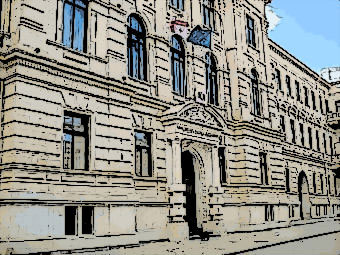 |
The
Supreme
Court
of
Georgia
explained
in a
drug
related
case
that
the
newly
emerged
circumstances
during
rehearing
the
case
can
not
be
subject
to
review
the
case
in
terms
of
proportionality
of
the
imposed
sentence
and
other
mitigating
factors
in a
given
case.
This
judgment
followed
the
new
law
of
22
May
2012,
on
Narcotic
Drugs,
Psychotropic
Substances,
Precursors
and
Narcological
Aid.
The
new
law
first
time
sets
small
quantities
for
Heroin
and
Methadone
and
thus
has
a
retroactive
effect.
The
newly
set
quantities
enabled
many
drug
crime
convicts
to
reapply
the
Appeal
Courts
and
reset
their
sentence
from
section
2 to
1 of
the
Article
260
of
the
Criminal
Code
of
Georgia.
Majority
of
drug
users
in
the
country
are
sentenced
according
to
the
section
2 of
the
article
260
of
the
Criminal
Code.
At
the
material
time
article
260
section 1
provides:
Illicit
preparation,
production,
purchase,
keeping,
shipment,
transfer
or
sale
of
drugs,
the
analogy
or
precursor
thereof,-
shall
be
punishable
by
imprisonment for
up
to
11
years
in
length
and
article
260
section
2
among
them
paragraph
a)
for
the
same
action
|
|
|
perpetrated
in large
quantities
shall be
punishable
by
imprisonment
ranging from
7 to 14
years in
length.
imprisonment for
up to 11
years in
length and
article 260
section 2
among them
paragraph a)
for the same
action
perpetrated
in large
quantities
shall be
punishable
by
imprisonment
ranging from
7 to 14
years in
length.
In this case
the
applicant on
28 September
2010
pursuant to
the
section 2
of article
260 was
sentenced to
12 years of
imprisonment,
punishment
below
maximum.
After the
new law
adopted, on
26 July 2012
the 31 years
old
applicant
applied to
the Tbilisi
Appeal Court
to change
qualification
from section
2 to 1 of
the article 260
and because
of
the mitigation
of law he
sought the
circumstances
of the case
taken into
account and
his sentence
proportionally
reduced. His
sentence
under
article 260
from section
2 to section 1 was
qualified
but the
mitigating
factors in
the case
file was not
assessed and
the
applicant
was given 11
years of
imprisonment
which is the
maximum
sentence
under
section 1 of
article 260.
In this
Supreme
Court case
(№39აგ-12)
the
applicant
was alleging
that his
sentence was
not
mitigated
but contrary
became
harsher. The
applicant
asked to
review the
circumstances
of his case
and mitigate
the sentence
in his
appeal to
the Supreme
Court.
The Supreme
Court
composed by
judges:
Davit
Sulaqvelidze,
Giorgi
Shavliashvili
and Paata
Silagadze
rejected the
applicant’s
claim and
ruled that
the court
pursuant to
the Article
3 section 2
of the
Criminal
Code “not
allowed”
reviewing
the
proportionality
of the
sentence and
the fairness
of a
judgment.
Article 3
section 2 of
the Criminal
Code
provide: “If
a new
criminal law
commutes the
sentence for
the action
wherefore
the convict
is serving
it, this
sentence
must be
shortened to
the extent
permitted by
the new
criminal
law”.
There were
no minimum
quantities
defined for
heroin and
methadone
before, and
there are
still no
minimum
quantities
defined for
many drug
substances.
In addition
the experts
and drug
user
communities
considering
the newly
set minimum
quantities
of 0.2 gram
for heroin
and
methadone
not relevant
and unfair.
This
judgment of
the Supreme
Court is not
only
theoretically
narrow-minded
but unfair
and inhuman.
In 2006,
since the
declaration
of Zero
Tolerance
Policy, in
Georgia it
is still
continued
the
implementation
of the inhuman
drug policy,
which is
wasted and
mostly
focused in
law
enforcement.
|
|
|
|
Drug
Policy
Legislative
Review
|
|
Responsibilities
and Rights
|
|
November 24, 2012 |
|
Drug Policy
Georgia |
|
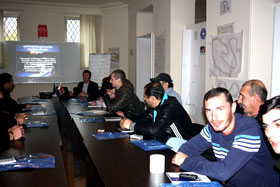 |
Is
it
possible
or
not,
and
what
kind
of
effective
ways
should
exist
to
change
harmful
drug
policy
in
Georgia,
who
must
be
active
and
who
is
to
participate
in
this
process.
These
were
one
of
the
heated
topics
among
participants
willing
to
discuss.
It
was
underlined
that
the
unities
of
these
self
organized
communities
and
to
speak
up
about
the
violations
and
the
principal
protection
own
rights
are
necessary,
also
to
reach
their
voice
not
to
only
public
in
general
but
particular
policy
makers
at
local,
central
legislatures
and
executive
governments.
The
meeting-seminar
with
the
users’
self-help
group
was
organized
in
Tbilisi,
at
the
office
of
NGO
New
Vector.
This
meeting
made
possible
within
the
European
Union
funded
project.
The
meeting
was
lead
by
lawyer
Levan
Jorbenadze.
During
the
meeting
|
|
|
the
discussed
actual
topics
interesting
among this
group were:
general
review of
Georgian
drug policy,
drug use –
administrative
and criminal
responsibilities,
HIV-positive
peoples’
responsibilities
and rights.
The
participants
provided
with the
information
about new
legislative
amendments
and how they
can
effectively
stand for
their rights
at the
domestic and
international
level.
The
participants
actively
discussed
the de facto
drug use
decriminalization
and
necessity of
legislative
amendments
in this
field as
well as
essential
measures for
effective
drug policy
at the
country
level. |
|
|
|
Drug Use in
Georgia |
|
Drug Policy
Legislative
Review
|
|
October 7, 2012 |
|
Drug Policy
Georgia |
|
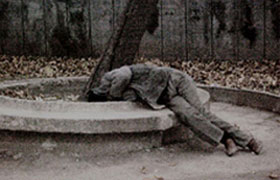 |
Introduction
The presented drug policy legislative
review
planned
and
published
in
July
2012.
This
review
made
possible
within
the
EU
funded
project:
“Harm
reduction-
an
oppression
or
the
evidence
based
interventions:
promoting
empowerment,
awareness
and
informed
policy
responses
in
Georgia”.
The
project
was
implemented
by
“Georgian
Harm
Reduction
Network”
and
the
“Penal
Reform
International”
Tbilisi
office.
The review is not general but rather
deals
with
those
detailed
amendments
that
have
a
critical
importance
to
change
one
of
the
harshest
drug
policies
in
the
region.
Based
on
the
complexity
of
the
topic
there
is
no
attempt
the
review
to
include
every
issue
of
concern
but
to
take
into
account
those
necessary
needs
which
have
the
most
importance
in
every
democratic
society
to
make
a
reduction
of
those
harms
caused
by
|
|
Picture
is
real,
no
imitation,
taken
in
Tbilisi |
|
|
illegal and
problematic
use of
drugs. The presented review is about the
existing
drug policy
in Georgia
during the
past decade.
The review
includes
periodically,
especially
since 2006
how Georgian
drug policy
has been
“developed”
and
“evolved”
towards the
harshness
not only at
criminal but
in civil
fields too.
The review of Georgian drug policy
gives us in
fact an
opportunity
to realize
that cruel
approach
chosen by
legislature.
Also it
enables all
interested
persons to
see clearly
about the
necessity of
those
legislative
amendments
which first
of all are
in the
interest of
the society
and thus
that of
democratically
developing
state.
Currently
the
publication
available
only in
Georgian
|
|
By Levan Jorbenadze |
|
Lawyer |
|
Drug Policy Georgia |
|
|
|
Georgian
Society
Supports
Tolerant
Drug Policy |
|
Levan
Jorbenadze |
|
Legal
Advisor/Attorney |
|
June 2,
2012 |
 |
On May 29, 2012 the Ministry of Justice
of
Georgia
revealed
Crime
and
Security
Survey
results
in
Georgia.
The
survey
comparable
to
recent
years
still
shows
that
Georgia
emerges
as
one
of
the
safest
places
in
Europe.
The part of the survey of drug crime reveals
that
71%
of
respondents
consider
establishing
tolerant
attitude
towards
those
who
were
ever
addicted
to
drugs
and
69%
think
that
community
has
an
obligation
to
take
a
very
good
care
of
drug
users.
Only
32%
thinks
that
drug
user
should
not
be
employed
in
public
institutions
and
11%
neither
opposes
nor
agrees
with
this
opinion.
59%
consider
that
drug
users
need
treatment
and
only
7%
support
imprisonment.
According to the Ministry of Justice –
one
more
2011
survey
conducted
last
year
by
Prosecutor’s
Office
confirmed
the
same
2012
survey
results
about
drug
crime.
The
Ministry
of
Justice
claims
the
surveys
became
the
foundation
in
forming
the
new
drug
policy
in
Georgia.
|
|
|
2012 Crime and Security Survey carried
out with the
initiative
of the
Ministry of
Justice, by
Georgian
Opinion
Research
Business
International
“Gorbi”
institute
and
supported by
the European
Union.
Nowadays police in some cases
tolerates
drug use but
Georgia
still has
one of the
harshest
drug
legislation
in Europe.
Additionally
the new
draft law on
narcological
aid which to
be adopted
soon
stipulates
new
unfavorable
provisions
among them
about the
advertisement
and
propaganda
of “drug use
places” that
in future
might be an
impediment
for harm
reduction
service
providers
and
advocates in
Georgia.
|
|
|
|
The Chance to Reclaim the Deprived
Rights
|
|
Levan
Jorbenadze |
|
Legal
Advisor/Attorney |
|
April 28,
2012 |
|
 |
On April 10, 2012 the Parliament of
Georgia
adopted
the
amendments
to
the
law
on
the
Procedure
of
Execution
of
Non-Imprisonment
Sentences
and
Probation.
According
to
the
parliament
the
amendments
were
initiated
by
MPs
Kakhaber
Anjafaridze
and
Zviad
Kukava.
For
now
the
amendments
can
mitigate
the
conditions
of
any
person
convicted
in
drug
crime
who
according
to
the
law
Against
Drug
Crime
are
deprived
the
significant
fundamental
civil
rights
such
as
driving
license,
doctor’s
license
and
attorney
license;
pedagogical
practice
and
the
right
to
be
employed
in
an educational
institution;
passive
right
(being
elected)
to
participate
in
elections;
right
to
be
employed
in
public
institutions;
right
to
make,
buy,
keep
and
bear
arms.
If a person convicted in drug crime
wants
to
reclaim
the
deprived
rights
or
reduce
the
period
of
deprivation,
must
apply
to
the
Standing
Commission
and
should
submit
the
appropriate
conclusion
of
the
drug
test.
However
it
is
up
to
the
Standing
Commission
to
decide
in
any
|
|
|
particular
case. The
Standing
Commission
operates
under the
Ministry of
Corrections and Legal Assistance and consists by
the
appointed
members from
the Ministry,
legislative
institution,
High Council
of Justice
and one
member from
the
community
based
organization.
Accordingly
the members
of this
Standing
Commission
are
appointed by
the Minister
of the
aforementioned
Ministry,
Parliament
and High
Council of
Justice.
Georgia has one of the harshest drug
policies in
the region.
The law
Against Drug
Crime was
enacted
since 3 July
2007. This
statute
deprived the
mentioned
main civil
rights
ranging from
3 to 15
years to the
persons
convicted in
drug crime.
However
since that
time there
were
attempts to
mitigate the
conditions
such as the
legislative
amendment of
February 25,
2011 which
made only
exceptions
in the case
of plea
bargaining
between a
prosecutor
and an
accused. The
law Against
Drug Crime
strictly did
not allow
any
reduction of
time
and reclamation of
the deprived
rights.
|
|
|
|
6
Years
Instead
of
Execution
|
|
Levan
Jorbenadze |
|
Legal
Advisor/Attorney |
|
April 1,
2012 |
|
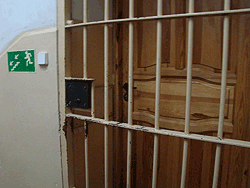 |
As
reported
on
October
2010
in
Malaysia
two
women,
both
Georgian
citizens
were
arrested
and
charged
for
drug
crime.
They
had
drug
-
Methamphetamine
in
the
large
amounts.
The
accused
Georgian
citizens’
life
was
under
threat
as
the
law
of
Malaysia
till
now
stipulates
capital
punishment
for
such
drug
crime.
Mainly
the
Prosecutor’s
Office,
Ministry
of
Foreign
Affairs
and
Public
Defender
of
Georgia
began
to
cooperate
and
negotiate
with the
Malaysian
state
appropriate
bodies and
organizations.
For
now
according
to
the
released
information
Georgian
citizens
have
the
qualified
defense
attorneys
who
also
discovered
some
new
circumstances
in
the
case.
According
to
the
detainees’
version
they
knew
nothing
about
the
drugs.
From
the
outset
when
such
information
released,
one
of
the
detainee’s
husband
who
arrived
from
Turkey,
voluntarily
appeared
to
Prosecutor’s
Office
of
Georgia
and
gave
affidavit
about
his
“main” |
|
|
role in this
drug crime.
Then the
Prosecutor’s
Office of
Georgia sent
the acquired
evidences to
the
Malaysian
counterparts.
On March 31,
2012 the
Ministry of
Justice of
Georgia
released
information
that Darejan
Kokhtashvili’s
as one of
the
detainee’s
accusations
mitigated
and instead
of execution
she was
sentenced to
6 years of
imprisonment.
There are
still
ongoing
negotiations
in Malaysia
and the
Prosecutor’s
Office of
Georgia
hopes to
succeed in
this case as
well and
save the
life to one
more
detained
citizen of
Georgia. |
|
|
|
HIV Positive
Woman for
Human Rights |
|
Levan
Jorbenadze |
|
Legal
Advisor/Attorney |
|
January 29,
2012 |
|
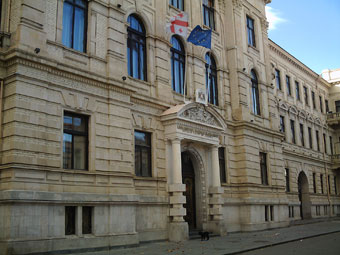 |
On 26 June 2012 information was released
that
HIV
positive
woman
dead
at
Kutaisi
Hospital
in
Georgia.
Her
name
was Lamzira
Chaladze,
who
showed
enough
courage
and
in
2005
openly
stated
that
as
result
of
medical
personnel’s
illegal
actions
she
was
infected
with
HIV.
In addition Lamzira Chaladze applied
to
the
court
to
protect
her
fundamental
rights
and
requested
reimbursement
of
200 000
GEL
for
pecuniary
and
non-pecuniary
damages.
According to the 25 September 2007
decision
of
the
Supreme
Court
of
Georgia
in
March
2001
the
plaintiff
gave
birth
by
caesarean
section
at
Kutaisi
#2
Maternity
House.
Her
relatives
bought
600gr
erythrocyte
mass
and
karyoplasms
from
LLC
“Kutaisi
Regional
Blood
Bank”
as
she
lost
a
large
amount
of
blood
and
needed
transfusions.
The
transfusion
performed.
As
later
in
September
2005
became
known
she
and
her
newborn
child
were
HIV
positive.
|
|
|
LLC “Kutaisi
Regional
Blood
Bank’s”
irresponsible
and faulty
action
incurred
the hugest
pecuniary
and moral
damages to Lamzira’s
family.
Stigma and
discrimination
continued
for years
against
Lamzira and
her family
members.
Lamzira had
husband and
some
children.
On 26 June
2006 Kutaisi
City Court
partly
satisfied
Lamzira’s
lawsuit and
LLC “Kutaisi
Regional
Blood Bank”
was imposed
20 000 GEL
in favor of
the
plaintiff.
The decision
was appealed
by both
parties to
Kutaisi
Appellate
Court.
Lamzira
Chaladze
requested to
fully
satisfy her
claim and
the
respondent
requested to
void
entirely the
judgment for
imposing 20
000 GEL, but
neither
of the parties were
satisfied
and the
decision of Kutaisi City
Court left
unchanged.
Lamzira
Chaladze did
not appeal
against the
decision of
Kutaisi
Appellate
Court in
spite of the
fact that
her request
partly was
satisfied
for 10% and
instead of
200 000 she
got 20 000
GEL.
Only LLC
“Kutaisi
Regional
Blood Bank”
appealed
again to the
Supreme
Court of
Georgia and
requested to
void the
judgment on
imposing 20
000 GEL. The
representatives
of the LLC
“Kutaisi
Regional
Blood Bank”
noted: the
court unduly
considered
that Lamzira
Chaladze was
infected
from the
donor’s
transfusions
as the
donor’s
blood was
not tested
for HIV.
The Supreme
Court
composed by
judges:
Mikheil Gogishvili,
Nunu
Kvantaliani
and Mariam
Ciskadze
held that
manufacturer
obliged to
provide the
information
of expected
results as
it makes a
sale of
goods, which
directly
refers to
the absolute
rights to
life and
health. |
|
|
|
Regional
Dialogue of
the Global
Commission
on HIV and
the Law |
|
Levan
Jorbenadze |
|
Legal
Advisor/Attorney |
|
May 31, 2011 |
|
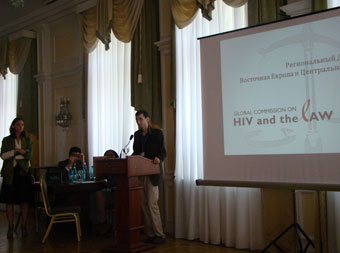 |
According to the Commission – Eastern
Europe
and
Central
Asia
is
the
only
region
in
the
world
where
the
HIV
epidemic
remains
on
the
rise
and
there
are
approximately
1.4
million
people
living
with
HIV.
The
Ukraine
and
Russia
account
for
about
90
percent
of
the
new
HIV
infections.
Access
to
antiretroviral
treatment
remains
low
and
accounts
only
19
percent.
Particular
concerns
are
vulnerable
groups,
such
as
injecting
drug
users
accounting
about
60
percent
of
the
new
HIV
infections,
as
well
as
people
in
prisons
and
police
jails.
Five
countries
do
not
allow
opioid
substitution
treatment;
drug
use
is
made
a
crime
in
six
countries.
Three
countries
criminalize
sex
work.
On 18-19 May, 2011 in Chisinau the
capital
of
Moldova
more
than
110
activists
those
with
direct,
personal
experience;
working
with
affected
and
vulnerable
population;
Academic
workers,
lawyers,
advocates
and
Government
representatives
from
13
countries
met
for
this
Regional
Dialogue
and
discussed
one
of
the
main
issue
such
as
legal
barriers
|
|
|
which
blocking
progress on
HIV and AIDS
in Eastern
Europe and
Central
Asia. The
purpose of
the meeting
with the
activists in
the field
was to
ensure their
voices are
heard and
the final
recommendations
are based on
the practice
of the law.
The working method of the commission
was clear
and rather
global.
First the
commission
collected
letter based
submissions
from all the
active
activists
from the
region. With
these
submissions
the activist
wished to
drew the
commission’s
attention on
the problems
existing in
their native
countries.
The
commission
selected
several
probably
from a
number of
thousands of
the
submissions
and invited
their
authors. On
the first
day the
regional
dialogue
conducted in
parallel
regime and
the
organizers
separated
the
government
and civil
representative
in different
conference
halls. As
planed not
all
government
representatives
from those
13 countries
of the
region
attended and
just three
of them
joined to
the
activists on
the second
day.
Contrary to the government the
activists
were very
active with
full of
enthusiasm
raised their
concerns as
most with
from
personal
experience
with the
goal to help
the
commission
to make the
outmost to
address
their
governments
with the
most vivid
and
effective
recommendations
and
concrete
plan to
follow-up.
The Global Commission on HIV and Law
launched in
June 2010 by UNDP to
provide
global
leadership
on
HIV-related
legal and
human rights
issues by:
analyzing
interactions
between
legal
environments,
human rights
and HIV;
fostering
evidence-informed
public
dialogue on
the need for
right-based
law and
policy in
the context
of HIV and
finally
identifying
clear and
actionable
recommendations.
Vivik Divan a lawyer from Bombay, who
works with
the UNDP
Group’s
Cluster on
Human
Rights,
Gender and
Sexual
Diversities
in New York,
opened the
first day of
the regional
dialogue
among
activists
and gave a
rather short
introduction
about the
commission
and answered
some of the
questions.
He
underlined
the
independence
of the
Global
Commission
on HIV and
the Law from
the UN
clusters and
stated that
final
product of
the
commission
will be the
powerful
recommendations
not the book
with 500
pages.
JVR Prasada Rao the member Secretary,
Commission
pushed the
enthusiasm
on the
participants
stating:
“you can be
a change
agent…”
Throughout
the two day
dialogue the
activists
worked hard
and
dispersed
with the
hope that
their
country
governments
will listen
to the
recommendations
which should
be ready at
the end of
2011. |
|
|
|
What the US
State
Department
Report on
Drug and
Chemical
Control
Activities
Says |
|
March 8, 2011 |
|
Drug Policy
Georgia |
|
 |
The
new
2011
Report
on
Georgia
is
comprised
by 4
sections
and
some
of
the
subsections.
First
the
report
describes
that
Georgia
produces
no
narcotic
drugs
but
for
its
location
bridging
Asia
and
Europe,
Georgia
is
becoming
a
major
transit
corridor
for
drugs
of
abuse
produced
elsewhere.
The
report
mentions
that
visa
free
travel
agreement
with
the
Islamic
Republic
of
Iran
can
lead
to
more
drugs
flow.
In
2010
Georgia
signed
this
agreement
with
Iran.
Consequently
concerns
follow
if
appropriate
inspections
and
checks
are
not
instituted
and
enforced;
this
agreement
could
lead
to
still
more
drugs
entering
Georgia:
“This
seems
likely
as
up
to
40
percent
of
Afghan
opiates
pass
through
Iran.
Smuggling
of
these
opiates
is a
problem
now
along
all
of
Iran’s
borders
to
the
South,
West
and
North,
so
there
is
good
reason
to
fear
that
easier
passage
between
Iran
and
Georgia
could
invite
traffickers
to
try
the
“new”
route”.
Speculation
on
drugs
flow
through
the
separatists
territories
of
South
Ossetia
and
|
|
Ministry
of
Internal
Affairs
of
Georgia |
|
|
Abkhazia
described in
the
introduction
section. The
report
outlines
that this
information
cannot be
verified as
these
territories
are beyond
the control
of Georgian
law
enforcement
and there is
little or no
exchange of
information
on drug
trafficking
between the
Russian
occupying
forces or
the de facto
governments
of these
territories
and the
Government
of Georgia.
5 main
drugs:
heroin,
Subutex,
methadone
and
marijuana
availability
revealed on
the domestic
market.
Subutex is a
trade name
for
buprenorphine,
produced
throughout
Europe, and
used for the
treatment of
opiate
addiction.
This
substance is
not a
registered
medication
in Georgia
and thus has
no legally
availability
basis.
Inaccuracy
in price
figures are
stated in
Supply
Reduction
section:
“drugs
generally,
and opioid
drugs in
particular,
are
extremely
expensive in
Georgia.
According to
the
information
provided by
the Georgian
Ministry of
Internal
Affairs in
2010, street
prices are
$600-$700
per gram for
heroin,
opium is
$27-$45 per
gram, and
Subutex is
$300 per 8
mg pill.
However,
some of
these prices
do not fully
correspond
with those
reported to
physicians,
by
street-level
narcotics
dealers and
their
drug-using
clients.
There is
also wide
variation in
drug prices
across
borders.
Local
sources
report that
pure heroin
purchased in
Turkey from
Chechen,
Kurdish or
Turkish drug
dealers is
available
for $40-$50
per gram”.
The report
says that
current
national
legislation
does not
conform to
UN drug
conventions’
requirements
and
2008-2009
drug control
reform
legislation
still
stalled in
Parliament.
The gaps
such as
absence of a
detailed
specific
Anti-Drug
National
Action Plan
and problem
of
coordination
among
institutions
are given in
the
subsection
B.: Drug
Control
Accomplishments,
Policies,
and Trends.
The current
Anti-Narcotics
National
Strategy
established
by the
Parliament
in 2007 only
outlined
main
priorities
and there
are no
specifics to
guide
implementation
noted in the
report.
Problems are
observed
throughout
systemic
drug
preventive
measures;
treatment
methods
which
developed
with little
or no
attention
given to
social
rehabilitation
following
detoxification;
inadequacy
information
about
dangerous
drugs, and
statistics
about drug
use that are
limited and
unreliable.
The report
notes that a
large number
of the drug
using
population
has
reportedly
moved to
home-made
synthetic
drugs.
According to
the report
there is no
statistics
for the
extent of
home-made
stimulant
drug usage.
There is
also
unreliability
about
figures for
drug
dependency,
as
statistics
are poorly
kept and
vary
according to
the source:
“The
Georgian
Research
Institute on
Drug
Addiction
and drug
treatment
estimates
the
intravenous
drug abuser
population
in Georgia
is
approximately
40,000 out
of a total
population
of 4.5
million.
Using UN
methodology,
researchers
estimate
that about
three
percent of
the
population
may be using
drugs at any
given point
in time,
yielding a
total of
approximately
138,000.
Local drug
treatment
experts cite
figures of
upwards of
200,000 drug
abusers,
including
one-time
experimenters”.
In spite of
Country’s
commitment
in increased
funding for
drug
treatment
and
prevention
there are
still
problems.
According to
the report
there is a
lack of
trained
human
resources in
the field;
expensive
detoxification
programs
administered
at four
government-funded
clinics have
the capacity
to treat 25
patients per
month and
the price of
detoxification
program is
$1000-$1500;
the primary
rehabilitation
program
costs $570
and
methadone
substitution
therapy
centers do
not include
an extensive
psycho-social
rehabilitation
program.
The
Government’s
commitment
in the
elimination
of
corruption
in law
enforcement
agencies is
also
outlined in
the report
that it has
made
significant
steps and it
remains
committed to
this effort
but in
conclusion
still
mentioned a
lack of
coordination
among the
agencies and
bodies
involved in
drug-related
issues
complicates
achieving
this goal.
Read the
full
2011 report
on Georgia
|
|
|
|
Two women
from Georgia
can be
sentenced to
death
in
Malaysia |
|
October 31, 2010 |
|
Drug Policy
Georgia |
|
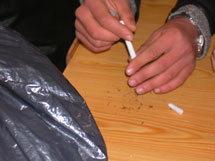 |
On
October
28
TV
Company
Rustavi2
reported
about
two
women
from
Georgia
arrested
for
syabu
(Methamphetamine)
worth
millions
hidden
inside
picture
frames.
Both
of
them
were
arrested
separately
after
their
arrival
in
Malaysia
on
Monday.
Malaysian
legislation
stipulates
capital
punishment
for
the
crime.
Local
media
said
the
detained
Georgian
citizens
may
be
members
of
an
international
syndicate.
Georgian
Foreign
Ministry
did
not
have
details
and
only
the
age
of
both
women
reported
to
the
public.
Later
as
of
October
29
Ministry
of
Foreign
Affairs
made
an
official
comment
after
having
managed
to
contact
the
detainees
and
get
information
about
the
incident.
The
situation
is
problematic
as
Georgia
doesn’t
have
into
the
field
any
international
agreement
with
Malaysia.
|
|
|
At
the same day
Public
Defender of
Georgia
released the
official
comment that
they intend
to
contact
with the
Ombudsmen’s
Association
of Asia and
Human Rights
Watch. The
officials
say that
they will
use all the
ways to
ascertain
situation
about the
detention of
two Georgian
citizens.
Sabah
Narcotics
Investigations
chief Supt
Abdul Rahim
Dolmat said
a
26-year-old
woman was
nabbed in a
hotel here
where syabu
worth
RM1.76mil
was found
hidden
inside photo
frames kept
in a bag.
“This is our
largest
seizure so
far,” he
said,
referring to
the
discovery of
5.5kg of
syabu in the
hotel room
during the
12.50pm raid
on Monday. |
|
|
|
Beware of
HIV/AIDS
Infected and
illegal sex
worker in
Georgia |
|
September
26, 2010 |
|
Drug Policy
Georgia |
|
 |
On September 15 2010, about 5 minute
footage
on
TV
Company
Rustavi2
tells
about
the
HIV
infected
illegal
immigrant’s
life
in
Georgia.
Her
full
name,
photo
and
passport
showed
and
the
anchor
hints
that
she
not
only
HIV
infected
but
she
is
illegal
sex
worker.
A girl from Cameroon found dead because
of
head
cancer
but
later
diagnosed
that
she
had
also
HIV/AIDS
infection.
The
directors
of
Clinical
Hospital
of
State
University
Gocha
Chutkerashvili
and
Nino
Qorqashvili-Charkviani
tell
the
journalist
that
this
girl
was
tested
HIV
positive.
The authors of the footage, journalists
of
the
TV
Company
investigate
and
show
to
the
public
further
details
of her
home,
educational
institution,
workplaces
(throughout
the
country)
and
position
as a
waitress.
They
also
interview
neighbors
who
telling
about
her
antisocial
life
in
Tbilisi.
|
|
|
All the actors of the story are not
only
unethical
but
also
violate
domestic
and
international
human
rights
standards of
this girl
dead in
Tbilisi and
once again
mounting the
official
registered
HIV/AIDS
statistics. |
|
|
|
International Overdose Awareness day |
|
August 31,
2010 |
|
According to
the European
Aids
Treatment
Group Press
Release
|
|
 |
Overdose
Awareness
Day:
Community
organizations
call
for
wider
availability
of
naloxone
to
prevent
thousands
of
unnecessary
deaths. Each
year
thousands
of people
in
Europe and Central
Asia lose
their
lives
to
drug
overdose.
The
direct
provision
of
naloxone
- a
safe
and
highly
effective
opioid
overdose
antidote
- to
people
who
use
drugs
could
effectively
prevent
thousands
of
unnecessary
deaths.
Overdose
is a
major public
health
concern.
In
many
countries
it
is a leading
cause
of
death,
taking
nearly
as
many
lives
as
car
accidents.
Since
1995,
overdose
has
claimed
between
6300
and
8200
lives
in
the European
Union each
year.
In Russia alone,
over
9000
overdose-related
deaths
are
registered
each
year.
The
real
numbers
of
deaths
are
thought
to
be
much
higher
than
the
officially
registered
cases. |
|
|
Naloxone, an
inexpensive,
safe,
non-narcotic
and highly
effective
medication
with no
potential
for abuse
reverses
opioid
overdose
within 1 – 5
minutes
after
administration.
Naloxone is
included in
the World
Health
Organizations Model
List of
Essential
Medicines
and is often
available in
hospitals
and
emergency
services.
Some
innovative
programmes
have been
distributing
naloxone
directly to
people who
use drugs,
their
friends and
family
members and
training
them how to
use it.
Research has
shown that
with
appropriate
training,
people who
use drugs
are as
skilled as
medical
providers in
recognizing
overdose and
assessing
when
naloxone is
indicated
for use.
Naloxone-based
overdose
prevention
programmes
began in the
UK, Germany,
and the
United
States in
the
mid-1990s,
and are now
practices in
more than 15
countries
with
striking
results. A
programme in
Chicago for
example
coincided
with a 30%
decrease in
overdose
death within
3 years of
the start of
the
programme
and similar
results have
been
documented
in other
cities.
Programmes
have been
successfully
piloted in
countries
throughout
Europe and
Central Asia
including
Italy, Portugal, Tajikistan, Kazakhstan,
Russia, Ukraine,
the UK, Georgia,
Germany and Spain.
---------
Naloxone is
available in
Georgian
Pharmacies
and sold to
everyone in
need. |
|
|
|
90 kg
Cocaine |
|
June 12,
2010 |
|
Drug Policy
Georgia |
 |
On
June
2,
2010
Ministry
of
Internal
Affairs
of
Georgia
Conducted
one
of
the
most
largest-scale
operation
arresting
transnational
crime
group
members.
As a
result
5
crime
group
members
are
detained.
They
have
been
accused
of
90
kg,
particularly
large
amount
of
drugs’
international
transit
traffic.
Scrap another party, in which 90 kg
cocaine
was
hidden
in
cargo
gang
members
received
in
Poti
in
order
to
be
later
trough
Turkey
distribute
them
in
the
international
markets,
presumably
in
Europe.
According
to
the
Criminal
Code
of
Georgia
mentioned
activity
|
|
|
punishable
with a
maximum
sentence
which is
life
imprisonment.
As a result of the special operation police found large
amount of
money
1 700 000
Euros, but
not
cocaine, referred to 90 kg.
After special operation high ranking officials from the
ministry of
internal
affairs and
the Ministry
of Justice
arrived in
Spain and
negotiations
began for
extradition
proceedings
regarding
the
detention of
other
members of
criminal
gangs in
Georgia.
The President rated the operation as successful, and later in
a briefing
the
Spokesperson
of the
President
said that
the seized
amount of
EUR 1
700 000 will
go to school
children and
will be used
for good
purposes.
|
|
|
|
Destruction
of
drugs |
|
March
27,
2010 |
|
Drug Policy
Georgia |
|
 |
On
March
26
2010
Ministry
of
Internal
Affairs
released
the
information
that
destructed 4500 pills
of
“subutexe”
drug,
“approximately
6 kg
of
heroine”
and 200
kg
of
marijuana
as
well
as
other
psychotropic
and
narcotic
substances.
On
the
basis
of
the
decree
of
Minister
of
Internal
Affairs
destruction
of
drugs
carried
periodically
in
every
three
month.
The
destruction
of
drugs
seized
from
illegal
circulation
is
organized
by
Standing
Commission
established
by
the
decree
of
the
Minister
of
Internal
Affairs.
These
proceedings
attended
by
the
representatives
from
the
Minister
of
Health,
Labour
and
Social
Protection
and
Prosecutor’s
Office.
|
|
|
Destruction
proceedings
of drugs
take place 5
kilometers
away from
residential,
drinkable
water and
grazing-lands.
The drugs
are
destructed
in pit deep
no less than
5
centimeters. |
|
|
|
Not only
repressive
punishment
of drug
addicts but
the serious
prevention |
|
March
21,
2010 |
|
Drug Policy
Georgia |
|
The
new
legislative
initiative
includes
the
control
over
the
employees
of
public
service
on
drug-addiction
which
will
become
more
severe.
If
adopted
the
new
amendments
the
periodic
drug
testing
will
be
regulated
on a
legislative
basis.
According
to
the
official
website
of
parliament
of
Georgia
during
the
sitting
of
the
Committee
on
Health
Care
and
Social
Issues
held
on
11
March
2010
the
author
and
one
of
the
representatives
of
the
opposition
in
parliament,
Dimitri
Lortqifanidze
said,
detection
of
narcotics
in
spittle,
urine
and
blood
is
not
informative
after
24
hours,
thus
inspection
of
employees
shall
be
held
by
means
of
hair
laboratory
analysis.
At
the
Hearing
of
the
committee
was
also
mentioned
that
adoption
of
the
Draft
Law
will
entail
changes
to
the
expenditure
part
of
the
State
Budget,
as
means
of
detection
of
|
 |
|
|
narcotics on
hair
analysis
will be
connected to
financial
expenses.
Deputy-Chairman
of
Parliament
of Georgia,
Giorgi
Tsereteli
stated that
drugs
impact on
adequacy of
people; this
may entail
improper
decisions or
criminal
actions.
Control on
drug-addiction
will be
periodically
held at
public
services.
“In Giorgi
Tsereteli’s
opinion,
public
service
shall be
free of
drug-addiction,
and it will
not be the
only
repressive
punishment
of drug
addicts but
the serious
prevention
as well.
Public
servant will
realize that
in case of
detection of
drug-addiction,
he/she will
be
unconditionally
dismissed”.
According to
the online
newspaper 24
Hours’ own
information
the
president
of Georgia
liked this
new
initiative
of the
oppositional
MP and
expressed a
wish and
readiness to
be examined
by hair
analysis
test.
The existing
Law on Public
Service,
articles 18
and 25
provides
that a
person
should
submit the
certificate
of medical-narcological
inspection
only upon
appointment
on the
position.
This is a
special
requirement
of the Law
on Public Service.
In spite of
no
regulation
of the
“periodic
testing”
the
government a
lot of times
applied
these
methods
before.
The hair
analysis
implemented
since 2007
at chemical
and
toxicological
laboratory
of the Levan
Samkharauli
National
Bureau of
Forensic
Science.
The new
method
allows
observation
of drug use
from 2 up to
4 months.
The test can
show the
dose and
type of drug
used.
According to the released information there are about 100 000 public
employees
in Georgia.
|
|
|
|
Signals from
drug
research (2010) |
|
March
7,
2010 |
|
Drug Policy
Georgia |
|
 |
What
are
the
latest
results
from
research
in
the
fields
of
the
social
sciences,
psychology
and
biomedicine
with
regard
to
drug
addiction
and
dependency
on
psychoactive
substances?
In
this
publication,
experts
in
these
three
areas
present
the
results
of
the
latest
research
into
the
problem
of
drug
addiction.
The
dynamics
of
the
cannabis
market
are
analyzed
through
the
lens
of
sociology,
whereas
researchers
in
psychology
look
at
personality
traits,
impulsivity
and
sensation
seeking.
In
addition,
the
most
recent
theories
in
neuroscience
and
dependency
are
presented.
Finally,
this
book
provides
information
on
what
treatments
are
available,
or
may
be
available
in
future,
for
drug
addiction.
This
inventory
of
signals
from
drug
research
should
interest
scientists,
those
working
with
drug
addiction
and
policy
makers
as
part
of
the
Pompidou
Group's
commitment
to
communicating
the
latest
research
findings
in
policy,
|
|
|
science and
practice in
the field of
drugs. |
|
|
|
Giorgi
Tortladze’s
Initiative
|
|
February 27,
2010 |
|
Drug Policy
Georgia |
|
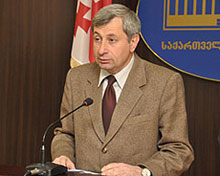 |
On
February
26
2010
President
of
Georgia,
Mr.
Mikheil
Saakashvili,
according
to
the
Constitution
and
the
Rules
of
Procedure
of
Parliament,
made
the
annual
report
to
parliament
addressing
the
people
and
the
members
of
Parliament.
After
the
speech
of
the
President
of
Georgia,
during
a
time
that
defined
for
Minority,
the
Chairman
of
the
"Powerful
Georgia”
Faction,
Giorgi
Tortladze
in
his
speech
underlined
the
issue
of
drug-addiction
and
stated
that
Parliament
shall
adopt
political
decision
concerning
this
question
and
confer
the
drug-addicted
persons
the
status
of
diseased,
and
as
for
the
drug-dealers,
on
the
contrary,
punishment
for
them
shall
be
more
severe.
|
|
|
The society
should
switch
slowly in a
condition
when drug
addiction is
disease not
a crime –
stated
Tortladze.
Giorgi
Tortladze
called
President
and members
of
parliament
to implement
tax free
regime at
first for
those
investors
who are
ready to
open drug
addiction
rehabilitation
centers.
|
|
|
|
Kick and
Drugs
|
|
February 20,
2010 |
|
Drug Policy
Georgia |
|
 |
A
YouTube
video
shows
footage
of a
police
officer
from
the
Special
Operative
Department
of
the
Ministry
of
Internal
Affairs
of
Georgia
(SOD)
stopping
the
police
car,
ordering
two
individuals
to
step
out
of
the
car,
and
then
proceeding
to
give
them
a
swift
kick
in
the
behind.
All
the
above
mentioned
details
are
screened
by a
SOD
officer.
Short
after
that
the
footage
is
posted
on
YouTube.com.
This
is
the
very
officer
whose
voice
is
heard
from
the
footage
who
after
kicking
tells
the
arrestees
that
they
are
free
to
go.
Soon
after,
the program of Week Reportage of Nana Lejava’s
GNS
Studio
covers
this
story,
and,
as
details
emerge,
it
turns
out
that
the
two
individuals
are
employees
of
the
Ministry
of
Finance.
In a
televised
interview,
Aleqsandre
Elisashvili,
a
public
activist
and
a
journalist
who
also
runs
a
talk-show
“Barieri”
at
the
|
|
|
TV
Company
“Kavkasia”
in Georgia,
tells the
“Week
Reportage”
program that
both
arrestees, a
deputy
Minister and
his friend,
were
arrested by
the SOD
officers for
illicit drug
use. After
the arrest,
the current
Prime
Minister
Nika Gilauri
made a phone
call to the
Interior
Minister
Vano
Merabishvili
asking him
to release
the
arrestees
because one
of them was
his
childhood
friend. The
Interior
Minister
called the
SOD officers
and told the
officers to
give the
arrestees a
kick in the
behind and
let them go.
The SOD
officers
followed
instructions
word by word
as ordered.
Aleqsandre Elisashvili got the above mentioned information from
employees of
the Ministry
of Finance.
In his
report, the
journalist
from the
“Week
Program”
tried to
have
response
from the
former
arrestee
(his face
can not be
seen on
footage) and
inquired
whether he
took any
action
against
SOD’s
officer’s
degrading
treatment.
But the
former
arrestee
told the
journalist
that he had
left the job
at the
Ministry of
Finance on
his own will
and he had
no comment
about the
kick and the
drugs.
This case is
an example
of Georgia’s
harsh drug
policy,
where
periodic
drug
testing
has led to
frequent
firing of
employees
from
positions in
the
government
sector. This
policy is a
legacy of
the
government’s
announcement
in 2006 of
zero
tolerance
towards drug
use in
attempt to
eradicate
drug use in
Georgia,
where the
population
of drug
users is
estimated to
be close to
250,000.
Furthermore,
the
government
refuses to
acknowledge
this public,
inhumane,
and
degrading
treatment
committed by
the SOD
officers.
According to
the online
newspaper
“24 Hours”,
former
ombudsman
and current
co-chairman
of political
unity
“Alliance
for Georgia”
Sozar Subari
held a
conference
on 26
January 2010
and stated
that: the
case is
about SOD
officers’
committing
inhuman and
degrading
treatment. “We
deal not
with
disciplinary
misdemeanor
but the
whole
cascade of
crimes
punishable
under the
criminal
law”.
|
|
|
|
|
|
|
|
New
round of
Amnesty Act |
|
November
7,
2009 |
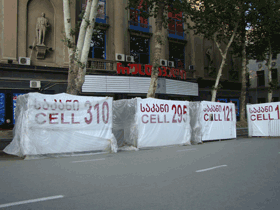 |
A
new
round
of
Amnesty
act
hearing
has
been
launched
in
parliament
of
Georgia
after
the
President
of
Georgia
initiated
the
draft.
As
it
was
declared
at
the
joint
session
of
Health
Care
and
Social,
Human
Rights
and
Legal
Issues
Committees
Amnesty
act
will
concern
1500
drug
user
convicts.
Amnesty,
which
is a
one
time
act,
shall
be
declared
by
the
Parliament
of
Georgia
toward
individually
unspecified
persons.
This
time
it
is
an
act
for
drug
users
unlike
the
previous
one.
On
November
2,
David Bakradze,
Parliament
Speaker
at
the
bureau
sitting
stated
that
he
had
the
consultations
on
this
issue
with
the
general
prosecutor
and
the
representatives
of
the
ministry
of
justice
last
week
and
they
have
come
to
this
joint
conclusion.
“We
must
give
|
|
|
opportunity
to
those
drug-addicted
convicts,
who are not
dangerous
for the
society, to
return to
the society,
usual life”
- stated
David
Bakradze.
The draft includes articles 260, § 1 and 273 of the Criminal
Code.
Article 260 § 1
stipulates
the
punishment
for illicit
preparation,
production,
purchase,
keeping,
shipment,
transfer or
sale of
drugs, the
analogy or
precursor
thereof - by
imprisonment
for up to
ten years in
length and
article 273
the
punishment
for “illegal
preparation
purchase,
keeping of
small
quantities
of
narcotics,
its analogy
or precursor
for personal
use or their
use without
doctor’s
prescription,
perpetrated
after
awarding an
administrative
sentence for
such
practice” -
by
imprisonment
for the term
not in
excess of
one year.
The
parliament
is going to
hear the
draft in a
speedy way.
The act will
enter into
force after
two weeks,
as approved
and will
last till
two months
period,
reported at
the
parliament
of Georgia.
|
|
|
|
Debate On
Drug Policy
Reform
Between The
Executive
And
Legislative
Branches |
|
Levan
Jorbenadze |
|
Legal
Advisor/Attorney
|
|
September 22,
2009
|
|
 |
Expected
changes
in
anti-drug
legislation
raised
controversy
between
the
Member
of
Parliament
Gigi
Tsereteli
and
Gia
Khuroshvili,
Parliamentary
Secretary
of
Georgian
Government.
On
21
September
some
news
agencies
reported
about
a
bit
hot
debates
between
executive
and
legislative
bodies’
representatives
over the issue.
Was
there
the
debate
about
anti-drug
changes
or
the
real
changes
in
drug
policy?
The
question
remains
as
an
unanswered
one
again.
This
time
more
important
is
that
the
information
about
expected
changes
more
or
less
became
known
to
the
public
at a
time
when
for
many
years
ago
nobody
“raised
voice”
but
only
few
non
governmental
organizations
implementing
some
projects
in
the
field
and
financed
by
international
donors.
Also
if
we
not
take
into
account
some
open
statements
from
high
officials
that
there
should
be
distinction
between
drugs
and
there
is a
need
of
legalization.
|
|
|
The
discussion
about the
changes in
drug policy
was
initiated by
above
mentioned
non
governmental
organizations
since 2005.
In fact
until now
there are no
changes that
took place.
Moreover
since
November
1, 2007 the
law against
drug users
implemented
titled as
the Law
against Drug
Crime. The
aim of the
law is
“idealistic”:
avoiding
drug
addiction,
protecting
public and
state
interests,
protecting
from drug
dealers and
preventing
drug
consumption.
In fact the
law
triggered
the way
towards
the
more
marginalization
of drug
users
depriving
them from a
number of
fundamental
civil
rights.
Only in 2008
a
draft law
package
introduced
to the
parliament.
The package
included the
changes in
less than 5
laws.
One of the changes was the abolishment of criminal
responsibility
of drug use.
Right now on
September,
2009 there
are again
controversies
between the
representatives
of executive
and
legislative
branches.
During the
debate the
representative
from
executive,
Parliamentary
Secretary of
Georgian
Government
stated that
he does not
think the
tolerant
approach
towards drug
addiction is
in the
interest of
the country.
It is
unknown to
the public
whether the
harsh policy
will
continue
against
people who
use drugs or
some changes
will occur.
The very
harsh
approach
that many
developed
countries
refused or
should have
done long
ago.
|
|
|
|
Gap
between
ideality and
reality |
|
Levan
Jorbenadze |
|
Legal
Advisor/Attorney
|
|
July 25,
2009
|
|
 |
New
draft
law
to
be
offered
on
HIV/AIDS
to
replace
the
existing
law.
The
bill
is
compiled
according
to
the
UN
guidelines.
The
new
law
introduces
the
new
provisions
for
effective
response
to
contemporary
challenges,
is
aimed
to
fill
the
gap
between
ideality
and
reality
and
take
off
unpractical
and
the
dead
norms
of
1995
law
on
HIV/AIDS
of
Georgia.
The
draft
law
ensures
the
formation
of
the
special
coordinating
board
institution
to
shape
new
policy
and
full
access
to
information
and
services
provided
in
the
field
of
HIV/AIDS
regulations.
|
|
|
The draft
provides
additional
Constitutional
and
International
guarantees
for the
rights of
people
living with
HIV/AIDS (PLWH)
such as full
access to
medical
services;
voluntary
testing; no
traveling
restrictions;
the strict
confidentiality
of the
status of
the person
during life
time and
after the
death;
firing from
job will be
prohibited
thus no
discrimination
of PLWHs at
the
workplaces
and in their
political,
cultural,
social,
economical
rights and
freedoms.
The bill is
MP
George
Tsereteli’s
initiative
and the
hearing
in the
parliament
is
scheduled
for
September
8-11,
2009.
The existing
Law on
HIV/AIDS
Prevention
and Control
was adopted
in 1995 and
revised in
1997 and
2000. As the
international
experts
claim
Georgia was
one of the
first former
Soviet
republics to
develop a
national
HIV/AIDS programme in
1994
followed by
a strategic
action plan
for
2003–2007.
|
|
|
|
Drug Policy
is a Public
Interest |
 |
Hungarian
Civil
Liberties
Union
(HCLU)
won
a
drug-related
freedom
of
information
case
against
Hungary.
The
European
Court
of
Human
Rights
(ECHR)
concluded
that
the
interference
with
the
applicant's
freedom
of
expression
cannot
be
regarded
as
having
been
necessary
in a
democratic
society.
It
follows
that
there
has
been
a
violation
of
Article
10
of
the
Convention.
Article
10
of
the
convention
provides:
“Everyone
has
the
right
to
freedom
of
expression.
This
right
shall
include
freedom
to
hold
opinions
and
to
receive
and
impart
information
and
ideas
without
interference
by
public
authority
and
regardless
of
frontiers…“ Thus in its judgment of 14 April 2009 the court recognized
the
right
to
access
to
state-held
information
as
part
of
Article
10
of
the
European
Convention
on
Human
Rights.
The
subject
matter
of
the
dispute
was
the
constitutionality
of
criminal
legislation
concerning
|
|
|
drug-related
offences. Member of Parliament and other individuals lodged a
complaint
for abstract
review with
the
Constitutional
Court. The
complaint
requested
the
constitutional
scrutiny of
some recent
amendments
to the
Criminal
Code which
concerned
certain
drug-related
offences.
The
applicant's
intention
was to
impart to
the public
the
information
gathered
from the
constitutional
complaint in
question,
and thereby
to
contribute
to the
public
debate
concerning
legislation
on
drug-related
offences.
The
applicant
brought an
action
against the
Constitutional
Court
requesting
the Budapest
Regional
Court to
oblige the
respondent
to give it
access to
the
complaint.
Constitutional Court of Hungary denied the request without
having
consulted
the MP,
explaining
that a
complaint
pending
before it
could not be
made
available to
outsiders
without the
approval of
its author.
In the Court's view, the submission of an application for an
abstract
review of
this
legislation,
especially
by a Member
of
Parliament,
undoubtedly
constituted
a matter of
public
interest.
The HCLU is
a non-profit
human rights
watchdog NGO
established
in Budapest,
Hungary.
HCLU’s
declared aim
is to
promote
fundamental
rights as
well as to
strengthen
civil
society and
the rule of
law in
Hungary and
which is
active in
the field of
drug policy.
|
|
May 9, 2009 |
|
Prison
Methadone
Program |
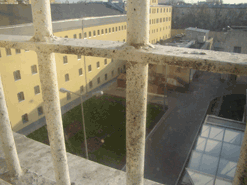 |
In Georgia the prison methadone program will be started in
the
mid
December
2008
as a
part
of
the
Global
Fund
to
fight
AIDS,
Tuberculosis
and
Malaria
(GFATM)
funded
project.
50
persons
will
be
enrolled
in
the
pre-trial
institution
no.
8
who
will
be
offered
a
long-term
detoxification
course
with
Methadone.
A workshop 'HIV/AIDS and Hepatitis C in Georgian Prisons:
from
Evidence
to
Action'
took
place
on
November
28
in
Tbilisi,
Georgia.
The
workshop
was
jointly
organized
by
the
Open
Society
-
Georgia
Foundation,
Canadian
HIV/AIDS
Legal
Network (CHALN)
and
World
Health
Organization
(WHO).
Workshop
participants
welcomed
the
fact
of
the
opening
of
the
methadone
pilot
program
in
Georgian
prison.
|
|
|
The objective of the meeting was education/skills- building
on HIV and
hepatitis C
prevention
and drug
treatment in
prisons, HIV
testing and
provision of
anti-retroviral
treatment in
prison and
alternatives
to
imprisonment.
The target
audience of
the workshop
was senior
policy
makers from
the Ministry
of Labour,
Health and
Social
Affairs (MOLHSA)
and Ministry
of Justice,
Department
of Execution
of
Punishment,
Georgian
prison
officials
Representatives of the the Canadian HIV/AIDS Legal Network (CHALN)
CHALN, WHO,
International
Center for
Advancement
of Addiction
Treatment,
Moldova
Prison
Department,
Bridjer
Addiction
Care
Institute
(Netherlands)
delivered
speeches at
the
workshop.
Meeting
participants
were
welcomed by
the first
Deputy
Minister of
Justice Tina
Burjaliani,
first deputy
Minister of
MOLHSA
Irakli
Giorgobiani,
Deputy
Chairman of
the
Parliament
of Georgia
Gigi
Tsereteli,
First Lady
of Georgia
and Chair of
the CCM for
GFATM
Projects
Sandra
Elisabeth
Roelofs.
Source:
Tea Akhobadze |
Open Society
Georgia
Foundation
|
|
Methadone
substation
treatment
launched
in Kutaisi
|
|
 |
New
Methadone
substation
treatment
center
to
serve
drug
addicted
people
from
1st
November
2008
in
Kutaisi,
the
city
in
the
west
part
of
Georgia.
This
is
a
one
year
long
pilot
program
funded
by
the
Ministry
of
Health
and
Social
Protection
of
Georgia.
From
the
beginning
only
70
drug
addicted
persons
will
be
involved
in
the
Methadone
substitution
treatment
and
all
of
them
are
Kutaisi
residents.
The
head
of
local
public
health
protection
department
stated
that
government
will
help
recovered
patients
of
this
program
in
employment
issues
as
well.
First
Methadone
Substitution
treatment
started
in
Tbilisi,
Georgia
on
28th
December
2005.
From
the
beginning
the
Methadone
Substitutive
Treatment
Center
at
the
State
Narcological
|
|
|
Science-Research
Institute on
Addiction
provided
free-of-charge
treatment to
60
eligible
opioid-addicted
drug users. |
|
|
|
Hair
analysis
tests to
detect
positive
result from
2 up to 4
months after
drug use |
 |
The
chemical
and
toxicological
laboratory
of
the
Levan
Samkharauli
National
Bureau
of
Forensic
Science
of
the
Ministry
of
Justice
held
up
to
1000
drug
tests
in
the
first
half
of
2008.
About
80%
of
tests
were
ordered
by
public
agencies.
About 700 blood examinations were held to identify alcoholic inebriation;
115
drug
tests,
110
tests
explored
ethyl
alcohol
in
urine
and
75
tests
drug
in
hair.
|
|
|
The lab implemented hair analysis in spring 2007. The lab had used urine
and
blood
tests
to
determine
drug
addiction so
far, but the
methods
showed only
short time
of history.
The new
method
allows
observation
of drug use
from 2 up to
4 months.
The test can
show the
dose and
type of drug
used. |
|
|
|
AIDS
treatment
center to be
opened in
Kutaisi
|
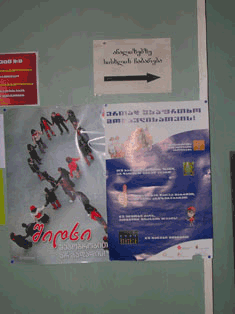 |
In
Kutaisi
one
of
city
of
Georgia
is
opening
AIDS
Infected
Prophylactic
and
Treatment
Center.
The
center
will
be
located
at
Infection
Diseases
Hospital
of
Kutaisi.
The
AIDS
center
will
have
modernized
medical
laboratory
and
serve
the
West
regions
of
Georgia.
Till
now
in
Kutaisi
was
available
only
the
HIV/AIDS
testing.
After
the
mentioned
center
opened
HIV
infected
people
will
need
no
arrival
in
Tbilisi
for
periodic
treatment
but
receive
the
assigned
one
in
Kutaisi.
The
center
is
planned
to
be
opened
within
a
month.
15.07.2008 |
|
|
|
|
Georgia on
the way of
drug policy
liberation |
|
 |
Drug use punishment will be eliminated
from
the
criminal
code
of
Georgia
acknowledged at the
hearing
of
Healthcare
and
Social
Issues
Committee
of
parliament
of
Georgia
on
January
29.
But
mandatory
treatment
and
community-based
useful
labour
will
be
imposed
as
an
administrative
punishment
in
case
of
repeated
use
of
drug
substances.
Accordingly
the
chairmen
of
Healthcare
and
Social
Issues
Committee
stated
that
drug
users
no
longer
will
be
imprisoned
but
fined
and
the
financial
resources
will
be
addressed
for
mandatory
treatment.
At
the
hearing
has
been
stated
that
the
harsh
policy
was
no
avail
towards
drug
use
crime.
Candidate
for
the
position
of
Prosecutor
General
of
Georgia,
former
Minister
of
Justice
Eka
Tkeshelashvili
stated
that
harsh
policy
will
be
continued
against
drug
criminals
but
the
legislation
should
be
liberated
concerning
to
drug
abusers.
Eka
Tkeshelashvili
pointed
that
criminal
measures
can’t
resolve
the
problem,
this
is a
complex
issue
and
the
law
should
be
liberated.
She
also
commented
about
the
legalization
of
soft
drugs
as
it
is
in
Holland.
Today
on
January
30,
President
of
Georgia
Mikheil
Saakashvili
kept
the
promise
and
reiterated |
|
|
at the
meeting with
media
representatives
that the law
should
distinguish
drug users
and drug
dealers.
Recently as
a
presidential
candidate
when he led
the polls
according to
the latest
data of the
Central
Election
Commission,
stated that
he was ready
to review
the drug
criminals’
cases as
some of them
might not be
actually
criminals
but the ill
persons in
need of
medical
treatment.
President of
Georgia also
expressed
the hope
that the new
candidate
for the
position of
Prosecutor
General of
Georgia will
implement
very
important
measures in
criminal
policy
regarding
this issue.
|
|
Mikheil
Saakashvili
claims
8000
drug users
have been
detained |
|
|
 |
On January
8, 2008 speaking
live in
political
talk show of
TV company
Rustavi2
- at the TBC
TV and the
prime time
studio 'the
Prime Time'
United
National
Movement's
presidential
candidate,
the former
president of
Georgia,
Mikheil
Saakashvili,
who leads
the polls
according to
the latest
data of the
Central
Election
Commission,
has stated
that he will
be ready to
review the
drug
criminals’
cases as
some of them
might not be
criminals
but the ill
persons in
need of
medical
treatment.
If one is
detained
only under
drug use
charge he
can not be
considered
as a
criminal.
Drug
addiction is
the illness
and should
not be
punishable
by criminal
law. Mikheil
Saakashvili
declared
that there
are 8000
drug users
detained and
this problem
is very
important
issue for
Georgia.
Mikheil
Saakashvili
noted that
accordingly
population
of the
prisons
should be
reasonably
reduced
during his
second term
in
government.
In the live
interview
Saakashvili
also pointed
out about
those
mistakes
which had
made during
his first
term. |
|
|
Unprecedented
Amnesty in
Georgia |
 |
The
parliament
of Georgia
with the
first
hearing by
121 votes
passed the
draft of
unprecedented
amnesty
which is the
president’s
new
initiative
presented to
the society.
According to
the
“unprecedented
amnesty”
1200
prisoners
and 1000
detained
(accused
persons
during
preliminary
investigation)
will be
released
stated
president’s
parliamentary
secretary
Zurab
Dekanoidze.
The amnesty
is related
to the
persons
accused or
sentenced
for crime
against
health as
intentional
light,
serious and
less serious
damage to
health;
crime
against
property as
property
damage or
destruction;
crime against entrepreneurial or other economic activity as
|
|
|
illicit
entrepreneurial
activity;
production, keeping,
sale or freight of
excise goods subject
to stamping without
excise stamps and
many other
misdemeanor and
negligence crime
categories.
Along with the unprecedented amnesty Mikheil Saakashvili
president of Georgia
will issue pardon
act which allow to
release about 1200
sentenced persons or
their term of
sentence will be
reduced stated the
chairman of the
Legal Issues
Committee
Levan Bejashvili
at the
Committee
hearing.
MP
Elene Tevdoradze
the chairman of
Human Rights and
Civil Integration
Committee noted that
the pardoned persons
will leave detention
institutions on
November 23 (at the
4th anniversary of
Georgia’s Roses’
Revolution). As
to the opinions that
this great act is in
support of
pre-election
campaign is wrong
because it has been
planed one month ago
– added Elene
Tevdoradze. Moreover
MP Elene Tevdoradze
remarked that pardon
act will not be the
only one but it is
quite possible that
one more be issued
again at the eve of
the New Year.
The difference between amnesty and pardon act is simple.
According to the
amnesty act the
criminal may be
released from
criminal liability
and convict may be
released from the
sentence or the
sentence awarded
against him/her may
be commuted to a
less severe
sentence. But
according to the
pardon act only the
convict may be
released from the
sentence or the
sentence awarded
against him/her may
be commuted to a
less severe
sentence.
Neither the “unprecedented amnesty” nor the pardon act is
related to some drug
crime articles which
according to the law
considered as
misdemeanor
category. The so
called
“unprecedented
amnesty” refers only
to the category of
drug crime as
article 272 of the
criminal code
(persuasion into
abusing narcotics,
its analogy,
psychotropic
substance, its
analogy). For this
reason at the
hearing of
Legal Issues
Committee
on November 21 one
of the opposition
faction leaders MP
Zurab Tkemaladze insisted
to release the
persons who are
sentenced under
article 273 (Illegal
preparation,
purchase, keeping of
small quantities of
narcotics, its
analogy or precursor
for personal use or
their use without
doctor’s
prescription,
perpetrated after
awarding an
administrative
sentence for such
practice) according
to that amnesty. MP
Zurab Tkemaladze
stated that
the above mentioned
article 272 implies
three years but the
article 273 - one
year of imprisonment
and why not the
persons sentenced
for article 273 –
(“illegal
preparation,
purchase, keeping of
small quantities of
narcotics, its
analogy or precursor
for personal use or
their use without
doctor’s
prescription”)
should not be
released according
to the amnesty. The
members of the
parliamentary
majority did not
agree with MP Zurab
Tkemaladze. The
majority
representatives
stated that anyway
for the coming
spring sessions
parliament of
Georgia plans to
remove imprisonment
from criminal code
as the measure of
punishment against
drug users. MP
Gigi Tsereteli
the chairmen of
Healthcare and
Social Issues
Committee
noted that practice
showed that
detention of drug
users is no help so
the
decriminalization of
drug crime should be
performed step by
step.
The Unprecedented Amnesty can be assessed as wrong and
discriminative
approach for persons
sentenced under
article 273. As the
Georgian government
stated the harsh
criminal law policy
will be continued.
So the government will continue fight against organized and drug
criminals; robbers
and other kind of
criminals in the
future to protect
each citizen of
Georgia.
|
|
Punishment without
Proof |
 |
According to
the draft
law new
supplementary
provision
will be
added to the
article 45
of
the
Administrative
Delinquency
Code of
Georgia: if
a person who
is under
suspicious
that used
drug or
psychotropic
substances
and refuse
to be tested
a police
officer will
make
conclusion
that the
person used
drug and
will fine
with 500GL
(about 298$)
or imprison
him with
administrative
imprisonment
for 30 days.
The proposed
law gives a
great
discretion
to any
police
officer to
interfere in
ones
personal
life and
expropriate
one’s
property.
As it
emerges from
the
amendments
if a suspect
falls under
suspicious
of police
officer that
he is under
influence of
drug
substances
and does not
follow the
instruction
of police
officer to
take him for
drug test to
the
appropriate
institution
he will be
fined and
moreover
presented
before the
judge for 30
day
administrative
imprisonment.
The author
of the
proposed
draft law is
Legal Issues
|
|
|
Committee of
Parliament of
Georgia.
It should be
mentioned that the
draft law does not
introduce any
circumstances in
which refusal for
drug test can be
justified, however
there can a lot of
ones.
A few weeks ago in
spite of the
Chairman of the
Healthcare and
Social Affairs
Committee
Gigi Tsereteli’s
statement that the
law should be
liberated towards
the drug users and
not punished with
imprisonment
meanwhile
parliament of Georgia continues harsh amendments in the
Administrative
Delinquency Code.
The proposed
amendment to the
Administrative
Delinquency Code of
Georgia anticipated
to be discussed in
Parliament of
Georgia on 30-2
November and the
plenary session will
be held on 6-9
November.
Article 45
Illegal acquisition
or possession small
amount of drugs
without a purpose of
distribution, and/or
their use without
doctor’s
prescription, - will
lead to a fine of
500GL or, in
exclusive cases,
according the
circumstances of a
case and personal
characteristics of
an offender when
this measure is
considered
insufficient, - with
administrative
imprisonment for 30
days.
Note:
1. Person, who
voluntarily hands
over drugs, which he
has in small amount,
acquired or
possessed without
the purpose of
distribution or who
voluntarily
addresses medical
institution when
acquiring drugs
without doctor’s
prescription, for
medical treatment,
will be free of
administrative
liability for
actions stipulated
by this article.
2. Police officer,
in case of serious
suspicious that a
person used drugs or
psychotropic
substances, will
present him to an
authorized
representative of
the Ministry of
Internal Affairs for
the purpose to test
an offender.
3. The rule of
conducting the test
process is
determined with the
joint order of the
Ministry of Internal
Affairs and the
Ministry of Health,
Social and Labour
Affairs.
In case a person
refuse to be tested
on use of drug
substances without
doctor’s
prescription is to
be considered under
influence and
appropriate
conclusion should be
issued.
By: Levan Jorbenadze |
|
Three-fold increase of drug offences in
Georgia
assessed as a positive trend |
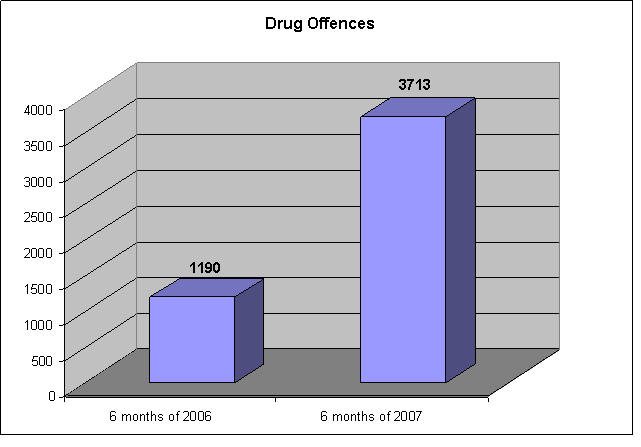 |
According to
the
information
of the
General
Prosecution
Service of
Georgia and
its
presented
analytical
research on
the
criminological
situation in
Georgia in
the first
six months
of
2007 while
the number
of certain
crime types
decreased
over the
reporting
period,
there has
been an
increase in
the
percentage
of drug
offences
within the
overall
reported
crime.
Reported
drug
offences
increased by
212 per cent
over the
reporting
period
compared
with the
first six
months of
2006.
Precisely,
1190 drug
offences
were
reported in
the first 6
months of
2006, yet in
the
reporting
period the
number of
reported
drug
offences in
3713. |
|
The
Prosecution
Service of
Georgia
itself
partly
explains
this
increase as
a logical
consequence
of the
Government
of Georgia’s
increased
fight
against drug
offences and
thus assesses as
a positive
trend. |
|
|
Hair
based
drug tests are
available in Georgia |
23
August,
2007 |
According to
the Ministry
of Justice the
chemical lab of the
National Bureau of
Forensic Expertise
of the Ministry of
Justice of
Georgia performs
hair based drug
tests. More than
3000 people have
been tested during
five months period.
Both public and
private
organizations apply
to the Bureau to
test staff members.
The drug tests used
to be done with
urine analysis, but
the method had
several defects. The
identification of
drug abuse was
available only for
several weeks.
The hair based drug
test allows finding
drug even after 3 or
4 months from use as
Khatuna Omiadze,
head of the lab said
- “this is main
advantage of new
method”. The test
allows to identify
drug type and
dosage. Therefore,
organizations
require hair based
tests for employees.
|
|
|
|
|
Methadone Treatment
&
American Way of
Happy End in Georgia |
 |
One day
trough this
web site I
have
received one
more letter
from a very
disappointed
woman asking
me a help to
bring her
acquaintance’s
husband in
Georgia who
appeared to
be drug
addict. Her
disappointment
was the
result of
negligence
from
government
and medical
representatives
of Georgia.
Her main
question was
very simple
as she asked
me if there
was any law
regulating
the arrival
of a drug
addicted US
citizen in
Georgia. I
send her
necessary
documents
and advised
how to work
with all
these papers…
|
|
|
After she gained
trust she told me
that her
acquaintance’s
husband was actually
her own husband and
our relationship
didn’t end here and
lasted many months
as on her way she
faced many other
problems. As we
finally understood
this case was a
precedent to the
government
representatives and
it has never
happened before to
anyone who wanted to
bring methadone and
to cross the border
of Georgia in a legal
way… Nowadays she
lives with her
husband and is very
happy. She readily
wrote the story and
told everything with
her own words and is
thankful to everyone
who tried his best
for her happiness. |
|
Levan Jorbenadze
|
|
Drug Policy Georgia |
|
May 28, 2007 |
|
|
|
My
husband and I have
met each other in
January 2006. The
very same year we
have got married in
the US. He is the US
citizen and I have
the Georgian
citizenship. As soon
as my dates of
staying in the US
had expired I came
back to Georgia and
started arranging my
immigration
paperwork from the
country of my
citizenship. The
arrangement of the
immigration
paperwork took us
too long, almost a
year so my husband
decided to visit me
here in Georgia.
While being busy
with his arrival
plans the great
issue came up on the
road. My husband is
using methadone in
US and he keeps
visiting the clinic
there and gets the
medication
officially as a
treatment. I tried
to find the same
kind programs here
in Georgia and went
to the few of
programs here but
the situation that I
came across was
pretty hard.
Hundreds of people
who are seeking for
the methadone
treatment are
staying in the long
lists and waiting of
their turn to be
called one glorious
day and being
involved in the
program and I wrote
down my husband's
name in one of that
kind so called
programs but still
after a year nobody
had contacted us
yet. God knows when
the clinic personal
will call us; we are
still waiting though
I have found out the
different ways of
solving our problem.
I
decided to go to
Tbilisi
international
airport to the
customs office there
and asked them if
there were any legal
ways of my husband
bringing his daily
amount of the
medication in the
country. As an
answer I have got a
smiling face telling
that it was almost
impossible any kind
of drugs to be
brought in the
territory of Georgia
and that my husband
would be arrested as
soon as crossing the
borderline. The same
I was told at
the Methadone
Substitutive
Treatment Center at
the State
Narcological
Science-Research
Institute on
Addiction.
I was shocked
hearing that
because I hoped that
there might be a law
for an ill person
bringing his daily
amount of medication
with him according
to the doctor's
special paperwork.
Very disappointed
and broken hearted I
came back home and
set down by the
computer and started
search about the
legislation and the
organizations
working in Georgia
about the above
mentioned problem.
Thanks God I came
across on a very
interesting web
address
www.drugpolicy.iatp.ge.
The web page has its
own lawyer that work
on the drug policy
and any kind of
issues that a drug
addict can come
across. I have got
to know this lawyer
personally and he
showed me the way
how to deal with the
problem. He is the
very capable and
experienced person
and the very
professional of his
work too. He advised
me to go to the
Ministry of Health,
Labor and
Social Defense of
Georgia and wrote a
letter to
the Minister of the
above mentioned
Ministry Mr. Chpashvili. In
3 weeks I have got
back replay letter
from the above
mentioned
ministry giving me
the rules and
regulations that
could solve my
problem.
With
the help of the
consultant of
Drug Policy Georgia I
have got all the
help with the
legislation, he
advised how to make
all the paperwork
ready for my
husband's arrival
that meant that I
asked my husband and
he had sent me the
letter form his
doctor indicating
his daily dosage of
the medication and
the number of days
how long he was
going to stay on the
country. With all
those documents
plus all the letters
that I have got from
the Ministry of
Health I went back
to the airport and
showed it to the
customs officer and
told him that it
was also possible
for the addict to
bring his dosage of
the medication in
the country legally
without violation
anything at all. The
customs
representatives were
very confused as I
think they had never
ever have heard
anything about that
kind of law at all.
All the paperwork
that I have gathered
I have left with the
"SOD" (special
operative
department) office
at the airport; they
are Representatives
of the Ministry of
Internal Affairs of
Georgia dealing with
drug crime. I must
say that I have left
the Xerox copies
with them and kept
the original ones
with me. All the
copes I have
sent to the Ministry
of Internal Affairs
to and asked them
the permission of
the medication in
the country
according to the law
of Georgia and the
letters from the
Ministry of Health
plus the letter from
my husband's doctor
from the US. In the
letters were
mentioned also the
arrival and the
departure dates of
my husband and his
passport information
too. At the airport
of Tbilisi I met my
husband together
with the assigned
representatives from
the Ministry of
Internal Affairs,
they checked him,
counted
medication according
to the paperwork and
wished us the good
luck and let us go
happily. That is how
my husband had
crossed the borders
of Georgia with his
daily amount of
methadone.
I
would like to thank
all the above
mentioned Ministries
and all the people
that helped me with
my problem and ask
all and every
citizen of Georgia
and of any country
to respect the law
and regulation and
trust the government
and be honest with
them. Only with
honest we can get
help all the time.
As
for the methadone
clinics in Georgia I
think that the way
of treatment and the
qualification of the
service and the
doctors are still
pretty low comparing
it with the Europe
or the US. Methadone
treatment is one of
the best and mostly
approved treatments
for the addiction.
My husband once told
me why do you need a
husband like me? I
am drug addicted you
know and can never
be cured from this
addiction? And I
answered him that
his addiction was
not a problem as I
was so madly and
very much addicted
to him and his love
and was going to
turn his drug
addiction into my
love addiction.
Sometimes we
must look into the
very deep angels of
our soles and
evaluate and
reevaluate all the
moral and social
values of both of
our friends
relatives family
members and just
anybody that belongs
to us and try to
help all the addicts
to make them see the
life from the
different point of
view and let them be
addicted to us and
our love and
devotion than to the
drugs. Let us save
even a one addict
during our hard time
and trust me that
God will reward us
and bring all the
love back to us that
we have ever given a
way. It had already
happened to me so
you try it too and
it will come true
for you too.
|
|
|
|
One More Zero
Tolerance
Show
in Georgia |
 |
Today
Georgia's
Deputy
Prosecutor
General Nika
Gvaramia has
held a press
conference
to present a
pack of
draft-bills
about
prevention
and
punishment
of drug
addiction,
including
penalties
against
criminal
drug addicts
and drug
dealers who
will be
expropriated
property.
General
Prosecutor's
Office
intends to
suggest a
new
initiative
to the
President.
Gvaramia
stated that
'General
Prosecutor's
Office
states that
it launches
a
large-scale
struggle
|
|
|
against a drug
addiction, which is
the number first
threat for our
state...
we make a first step
towards an
anti-narcotic
strategy'. Gvaramia
also stressed that
the government would
show a zero
tolerance to those
'who sells drugs'
and drug crime will
be one of the
heaviest crime in
Georgian
legislation! It will
be the legislation
with zero tolerance.
Mr. Deputy
Prosecutor General
even thinks to make
necessary changes in
the presented draft
law and deprive the
property of those
who is already
convicted in drug
dealership. Mr.
Gvaramia in his
interview with the
TV Company Rustavi 2
mentioned that the
deprivation of the
property those who
are already
convicted are
against our criminal
law and constitution
but he sees no
problems! He further
suggested those
unsatisfied address
with complaints to
the Constitutional
Court.
According Gvaramia,
the General
Prosecutor's Office
will propose a pack
of draft-bill about
struggle for
criminal drug
addicts, which will
regulate tens of
restrictions for
drug dealers and
drug addicts.
According Gvaramia
only registered drug
users will be
treated as ill
people and the rest
non registered ones
as criminals only.
There will be no
amendments in the
criminal law and
drug use will be
punishable again.
According to the
draft there will be
the additional
administrative
measures implemented
against drug users.
Non registered drug
user who will be
treated as criminal,
he also will be
deprived: driving
license, pedagogical
practice, doctor’s
license, passive
right to participate
in elections, right
to work at public
service and in
otherwise they will
be excluded from the
society as well.
MPs, both
representatives of
the Parliamentary
Majority and the
parliamentary
opposition, have
welcomed a new
draft-bill proposal
of the General
Prosecutor's Office
about struggle for
criminal drug
addicts. According
to the MP, the
members of the
faction Rights'
Opposition Pikria
Chikhradze, her
faction backs the
proposal and they
also back maximum
penalty measures for
the drug dealers,
which will have to
be regulated by the
draft-bill. Mrs.
Chikhradze stressed
that draft should
allow us to make
difference between
drug dealers and
drug users. The MP,
the member of the
faction Democratic
Front, Davit
Zurabishvili doubted
that 'some people
are still working at
the Interior
ministry, who
promotes and
monitors a drug
dealing in the
state', there for
struggle have to
begin from that
place.
Nika Gvaramia asked
for assistance to
the police, church
and media in the
fight against drug
addiction. In the
interview with the
TV Company Rustavi 2
government
associated artists
and other popular
people supported not
only the intended
policy but also made
comments that drug
users’ punishment
should be harsh and
an “example” for
others in the sense
of the prevention of
drug addiction in
the society. The
official comments of
the Georgian
Orthodox clergy
representatives were
to support the
government’s
initiative and
approve the
restrictions against
drug dealers and
drug users too.
According to the
comments drug
addiction should be
treated as: illness
and cowardness.
Drug Policy Georgia
By: Levan Jorbenadze
May 15, 2007
|
|
|
|
 |
Subutex Related Case
in Strasbourg
Basiladze
v. Georgia
At a recently held
conference,
representatives from
the “Union Article
42 of the
Constitution” stated
that the decision of
the European Court
of Human Rights can
change the
conditions of
prisoners who are
held in custody for
purchase,
possession, and sale
of Subutex,
medication used to
treat dependence on
opioid medicine and
illicit drugs, such
as morphine and
heroin.
Local Georgian
nongovernmental
organization “Union
Article 42 of the
Constitution”
submitted their case
which addresses the
sale and use of
Subutex in Georgia
to the European
Court of Human
Rights. Georgian
citizen Ramaz
Basiladze’s rights
will be defended by
the attorneys of the
“Union Article 42 of
the Constitution.”
|
|
The members of the
organization
hope that they will
win their case and,
as a result, the
European Court of
Human Rights will
recognize legal
mistreatment
of those
people who are
adjudicated for
Subutex in Georgia.
During the
exploratory process,
attorneys of the
organization
discovered that
Georgian government
violated United
Nation’s
International
Conventions on
Narcotic and
Psychotropic
Substances.
According to these
international
documents, “buprenorphine,”
contained in Subutex,
is not a narcotic,
but
psychotropic
substance. However,
“buprenorphine”
in Georgia’s
domestic law is
treated as narcotic
substance. According
to the article 6 of
Georgian
Constitution,
domestic laws should
not be in
contradiction with
international
conventions and
documents. In cases
of contradictions,
every judicial organ
is obligated to
judge the case in
compliance with
international
documents. Attorney
Manana Kobaxidze
stated that in this
case Georgia’s
judges violate the
Constitution by
contradicting their
conclusions with the
international
conventions.
Members of the
“Union Article 42 of
the Constitution,”
who have won a
number of cases in
the European Court
of Human Rights in
Strasbourg, affirm
that Basiladze and
many more
individuals are
unlawfully accused
and imprisoned for
illegal sale and use
of narcotic
substances. Illegal
sale and use of
narcotic substances
constitutes
imprisonment up to
10 years. According
to the Criminal Code
of Georgia, illegal
sale and use of
psychotropic
substances is a
felony and
is punishable by
imprisonment for up
to five years.
Ramaz Basiladze’s
case shows violation
of articles 5, 6 and
13 of the European
Convention on Human
Rights, which
provide right to
liberty and
security, right to a
fear trial and right
to an effective
remedy.
Drug Policy Georgia |
|
|
|
|
No Single Case of HIV
Infection Detected
According to the Ministry of
Justice the prisoners who
were tested for HIV/AIDS in
treatment departments of the
prisons no single case of
HIV infection detected. In
voluntary testing
participated 200 from 260
prisoners.
According
to the date there are 22
infected prisoners in
Georgia. They all are in
medical departments under
doctors’ supervision.
|
 |
|
 |
According to the non
governmental organization
“Civil Society Institute” on
February 14 the Ministry of
Internal Affairs of Georgia
proposed the new draft law
to make amendments on
Georgian Law on narcotic
drugs, psychotropic
substances, precursors and
narcological aid. The new
provision was added by which
the Ministry of Internal
Affairs of Georgia will
define the tests for
alcoholic and drug
consumption. The parliament
of Georgia will dispute the
draft law on March 14-17.
|
|
|
Everyone will go to
prison!
It is the extract from president
Saakashvili’s annual address to
parliament
which has been published on the
official web site of the president
of Georgia:
14 February 2006
I am announcing a new draft law
with zero tolerance for petty
crimes. I will introduce
amendments to the Criminal Code
which will abolish probation
sentences for burglary, mugging,
pick-pocketing and possession of
drugs. There will be no probation
sentences.
No judge will be able to release
someone on the basis of their own
views on humane reasons.
who commits these crimes will go
to prison, because they damage our
society.
By the way, many MPs have been
victims of crime, as have your
families and relatives. The police
catch pickpockets, burglars and
muggers outside |
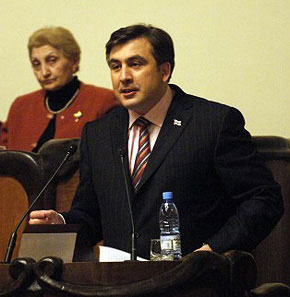 |
|
peoples' houses but then some
judge, like [Merab] Turava
[recently dismissed Supreme Court
judge], lets them go
the next
day.
That is not good. At whose expense
is this being done? Where do they
go when they are released? To Mars
or the moon? They go back on the
street, to your houses, into your
courtyards, to your children,
wives and friends. Is that not
true? |
|
They will do anything. For
example, someone is arrested for
selling drugs and then the judge
decides that because they have a
52-year-old grandmother they
should be released on probation.
Never mind that they have been
sentenced seven times, the judge
will forgive them an eighth time.
For that we will build a new
remand prison for 3,000 and more
prisoners if necessary in Tbilisi.
We are always prepared to make
more room for bandits to take them
off our streets and away from our
schools so that we can forget
about them. There will be zero
tolerance for any kind of petty
crime, my friends. That is our
new, very firm, policy, which the
judiciary, parliament, the
executive government and the
police should adopt.
The unending fight against drug
addiction. Do you know what a
tragedy this is? One of the main
narcotics trafficking routes from
Afghanistan goes through Georgia.
The more the income of young
people grows, the more the price
of drugs falls. It is now easier
to find drugs than bread. I am
announcing that over the next four
months every state employee will
undergo a proper drugs test. This
is not the kind that Lezhava (the
supervision board chairman of
Georgian State Narcological
Science-Research Institute on
Addiction) used to do in the
Justice Ministry or somewhere.
These will be proper drugs tests.
In a few months there will no
longer be a single drug user in
state service, or I hope, working
in parliament. We will do that.
The public has the right to have
clear-thinking people working in
state bodies.
We are a country that is building
many hospitals, schools, roads,
fountains and prisons when
necessary, because we are a state
that needs prisons, schools and
hospitals. A state knows how to
defend its citizens and their
health, how to develop their
education system and their
opportunities and how to punish
those who are preventing society
from developing.
|
|
|
The Methadone Substitutive
Treatment Center
|
Information About Methadone
Substitution
Treatment Program in Georgia
The Methadone
Substitutive Treatment Center at the
State Narcological Science-Research
Institute on Addiction provides
free-of-charge methadone substitution
treatment to
opioid-dependent drug users. To
be eligible, a patient
-
Should be 25
years or older;
-
Should have used
opioid
drugs for at least 3 years;
-
Should have
previously received treatment at
least twice in appropriate
institutions and has certificates of
treatment.
|
|
|
|
|
Currently the
Methadone Substitution Treatment
Center provides a step-by-step service
to 60 patients. Each patient receives
individually tailored treatment and,
under a doctor’s supervision, a daily
dose of methadone mixed with juice.
The methadone substitution treatment
lasts between 6 months and 1 year.
The treatment is
not anonymous but confidential. It is
run according to the agreement with
the Ministry of Internal Affairs.
The Methadone
Substitutive Treatment Center at the
State Narcological Science-Research
Institute on Addiction will be
selecting a new group of approximately
60 patients for spring 2006.
To find out more
about methadone substitution treatment
in Georgia, contact the Center at its
hotline: 39-93-92 |
|
|
Methadone
Substitution Treatment in Georgia
|
|
"Thanks
to Global Fund, today first 8 patients
received methadone at the substitution center
of the Research Institute on Addiction”.
According Khatuna Todadze the Program
Coordinator of State Research Institute on
Addiction Methadone substitution treatment
is started in Georgia on 28th
December 2005.
|
|
Killer
in the City
|
|
Anti-drug
campaign, which has been under way in
the capital of Georgia for several days
and resulted in transparencies with
different writings on them (“Killer in
the City”, “Who is the Next” and
many other slogans in the heart of the
city shocked the society).
According to the participants, this
|
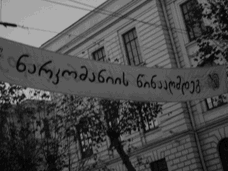
|
action has
produced specific result and gave
opportunity to the population to once
again realize the danger created by
drugs.
"We
might have frightened
somebody,
but the population shall understand that
drug addiction is
|
a big problem and
everybody shall fight against it",
said the participants of
the action.
There have again appeared some banners in the streets of the
capital.
|
|
Counsel of
Europe
Publication |
 Ethics
and drug addiction
This new publication in the "Ethical
eye" collection, covering both the major
issues involved in combating drug
addiction and specific cases,
has been written
by Ethics
and drug addiction
This new publication in the "Ethical
eye" collection, covering both the major
issues involved in combating drug
addiction and specific cases,
has been written
by
doctors, psychologists, legal
experts and drug addiction specialists
working in
Europe
.
It was inspired by the work of the Council
of Europe’s "Pompidou Group",
which brings together experts in the
prevention, treatment and punishment of
drug addiction. It shows that, quite
apart from the moral issues it addresses,
ethical analysis makes it possible to
devise effective collective and individual
strategies for dealing with drug
addiction.
|
Whether
out of choice or social necessity, trying
to "make people happy against their
will", in this case by depriving them
of a product they do not necessarily want
to give up, raises moral issues, whether
one considers the protection of the
individual or of society. The
publication addresses the issues of
prevention, screening and confidentiality,
and goes on to review the policies of a
number of countries. Some of them
have concentrated, as
Russia
did until October 1993 and
Sweden
is still doing today, entirely on
compulsory treatment, but are finding that
such methods are completely or partially
ineffective: as this book points out,
through numerous examples, individual
consent is the basis of successful
treatment. Even where there is no
universal compulsory treatment, however,
the automatic placement and enforced
treatment to which offending and convicted
drug addicts are subjected in many
countries raise not only ethical but also
medical and legal issues.
|
The
publication tackles the problem of drug
addiction in the workplace, with all that
it entails in terms of safety at work, but
also the issue of medical secrecy in the
light of the public interest.
Substantial coverage is given to drug
addiction among minors, particularly at
school, their access to treatment and its
confidentiality, not least as far as their
families are concerned, and care for
pregnant women and young mothers who are
addicted to drugs. An outline of the
Pompidou Group's activities and a few
reference documents complete the book.
Counsel
of
Europe
Publication: Ethics and Drug Addiction
|
|
Anti-drug
Campaign
|
|
 |
Chairman of the
Georgian Parliament joined the
launched anti-drug campaign. Nino
Brujanadze states that the
Parliament will do its best to
resolve this problem in the country.
In the near future, a meeting will
be
|
|
organized
with the initiators of this action in the
Legislative Body, where Chairmen of the
Committees will be instructed to improve
the legislation.
|
|
|
|
|
   |
|